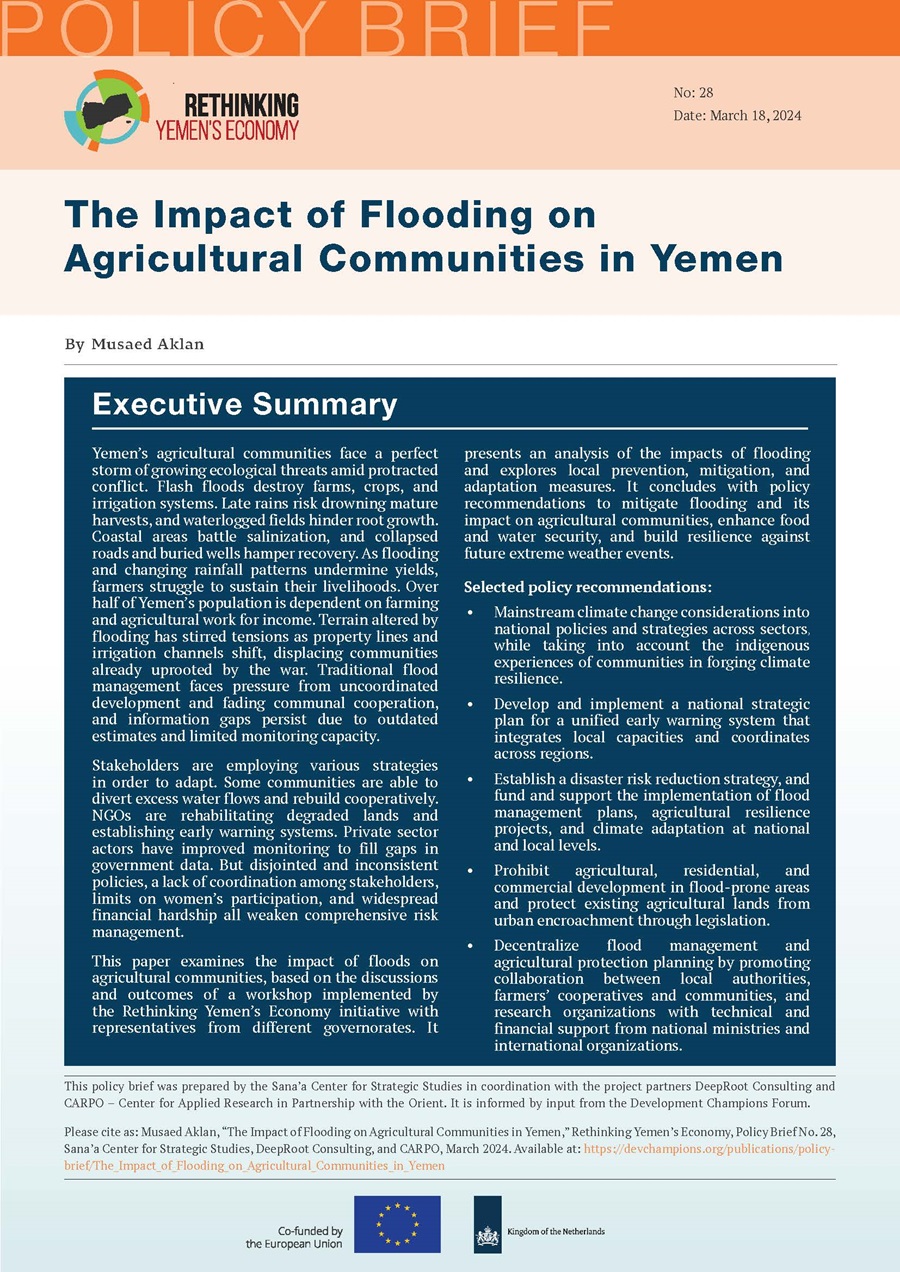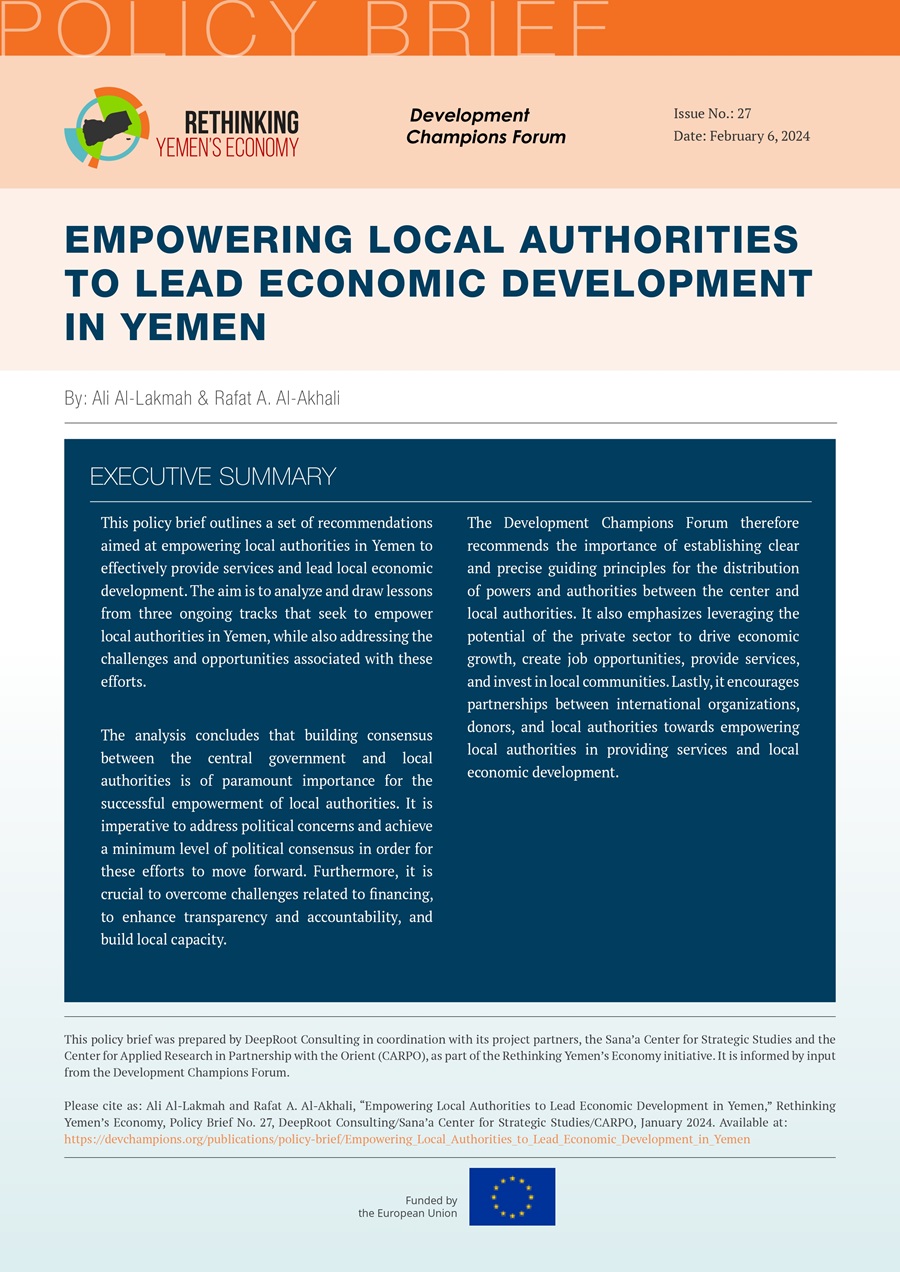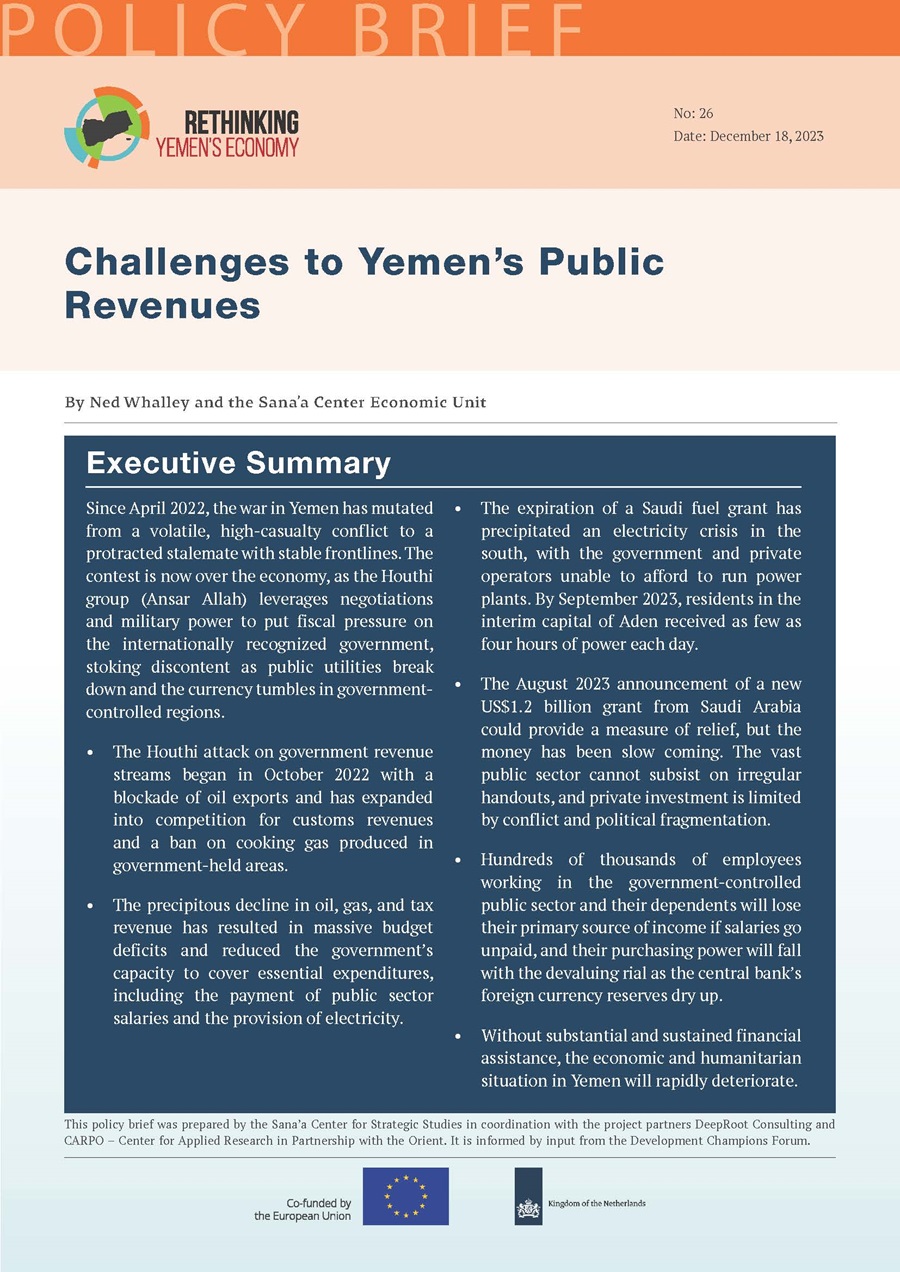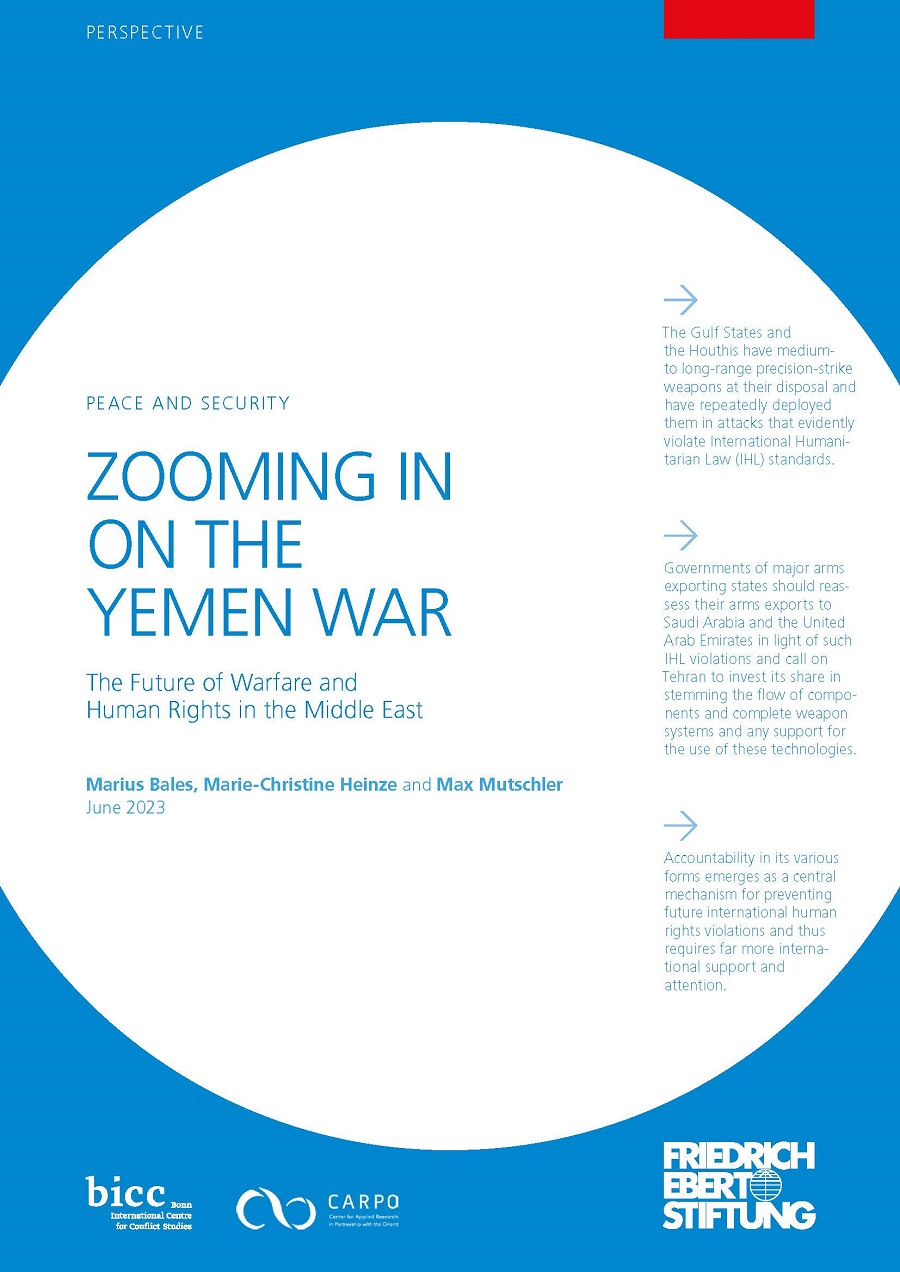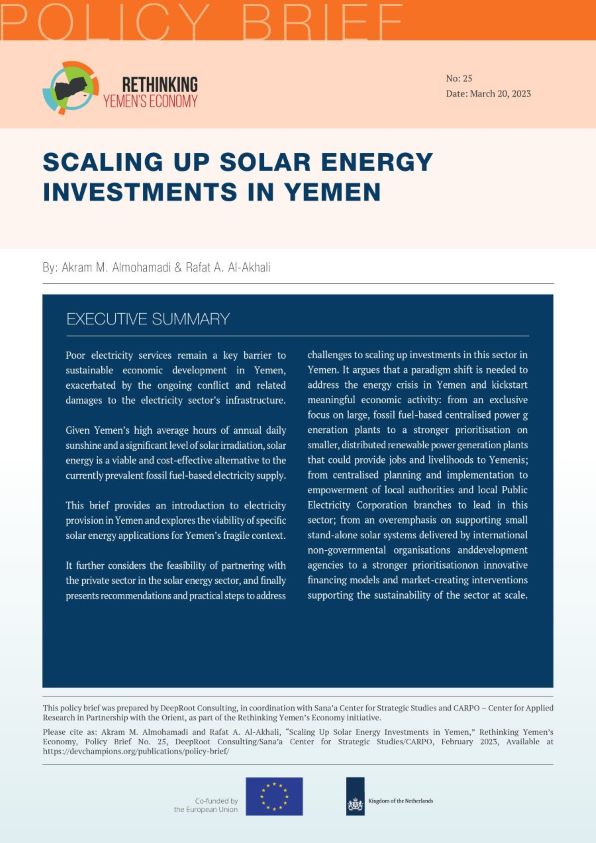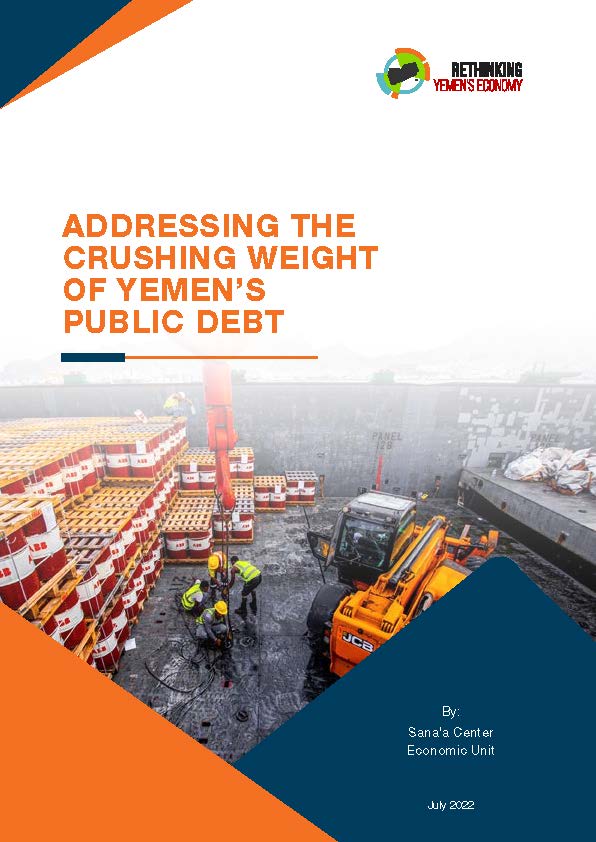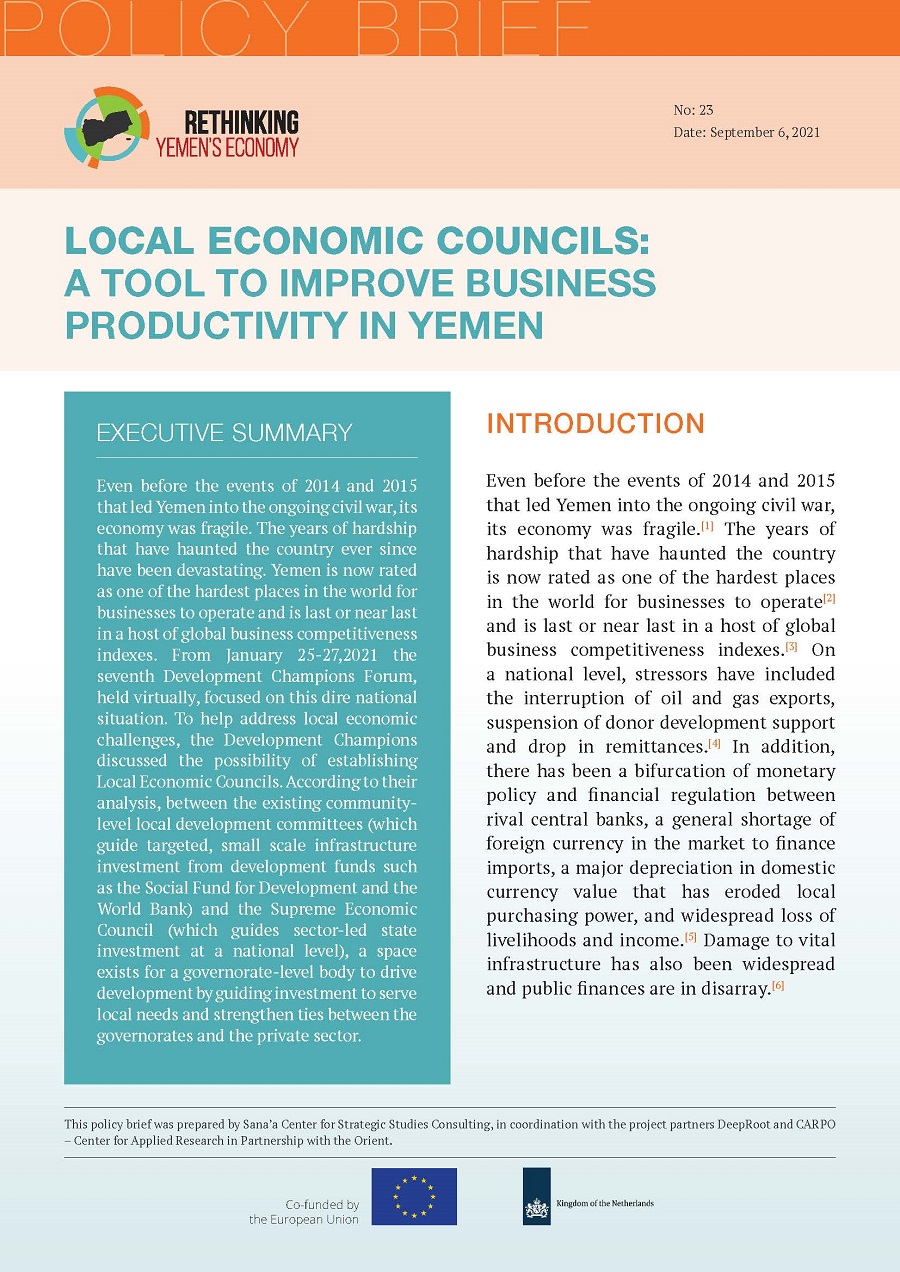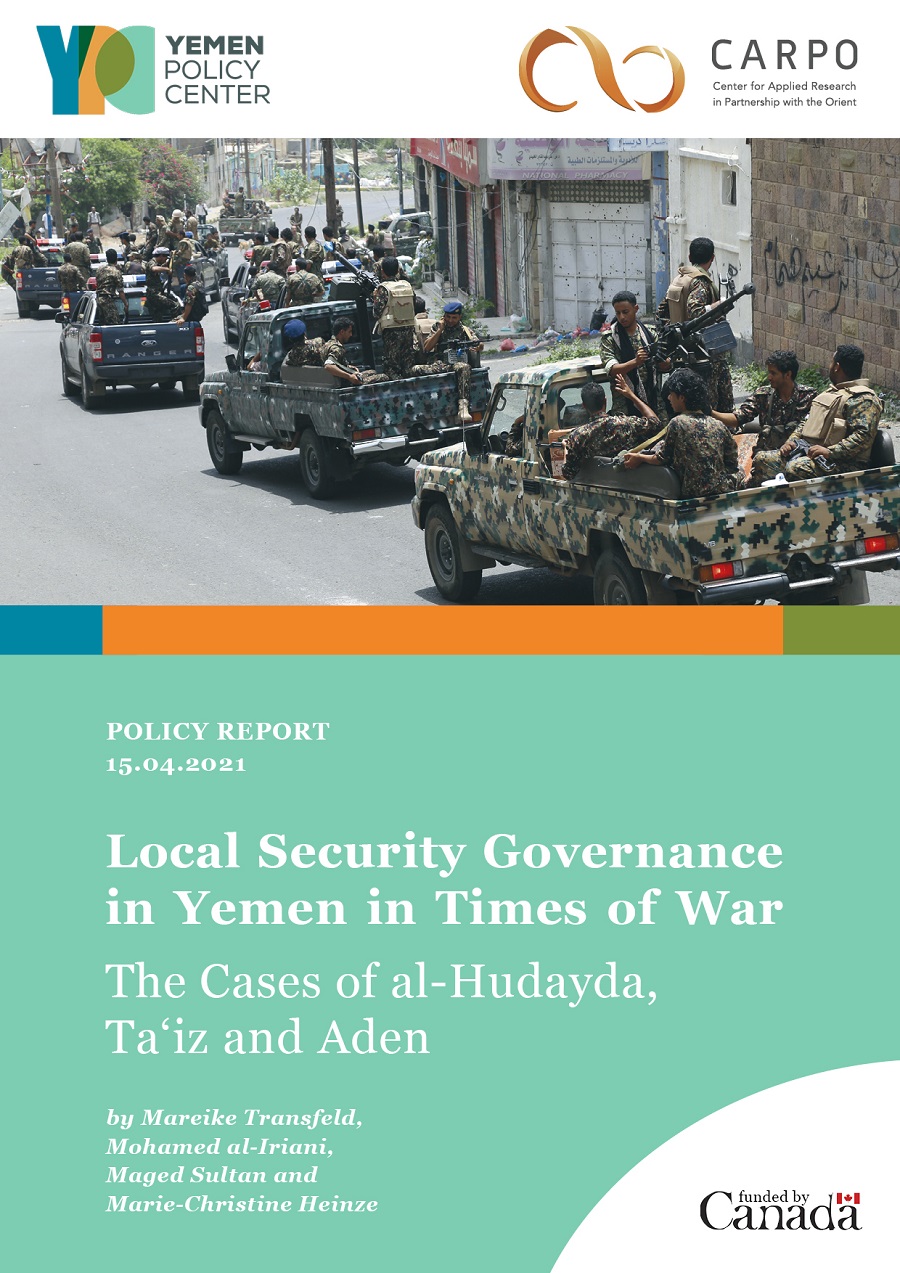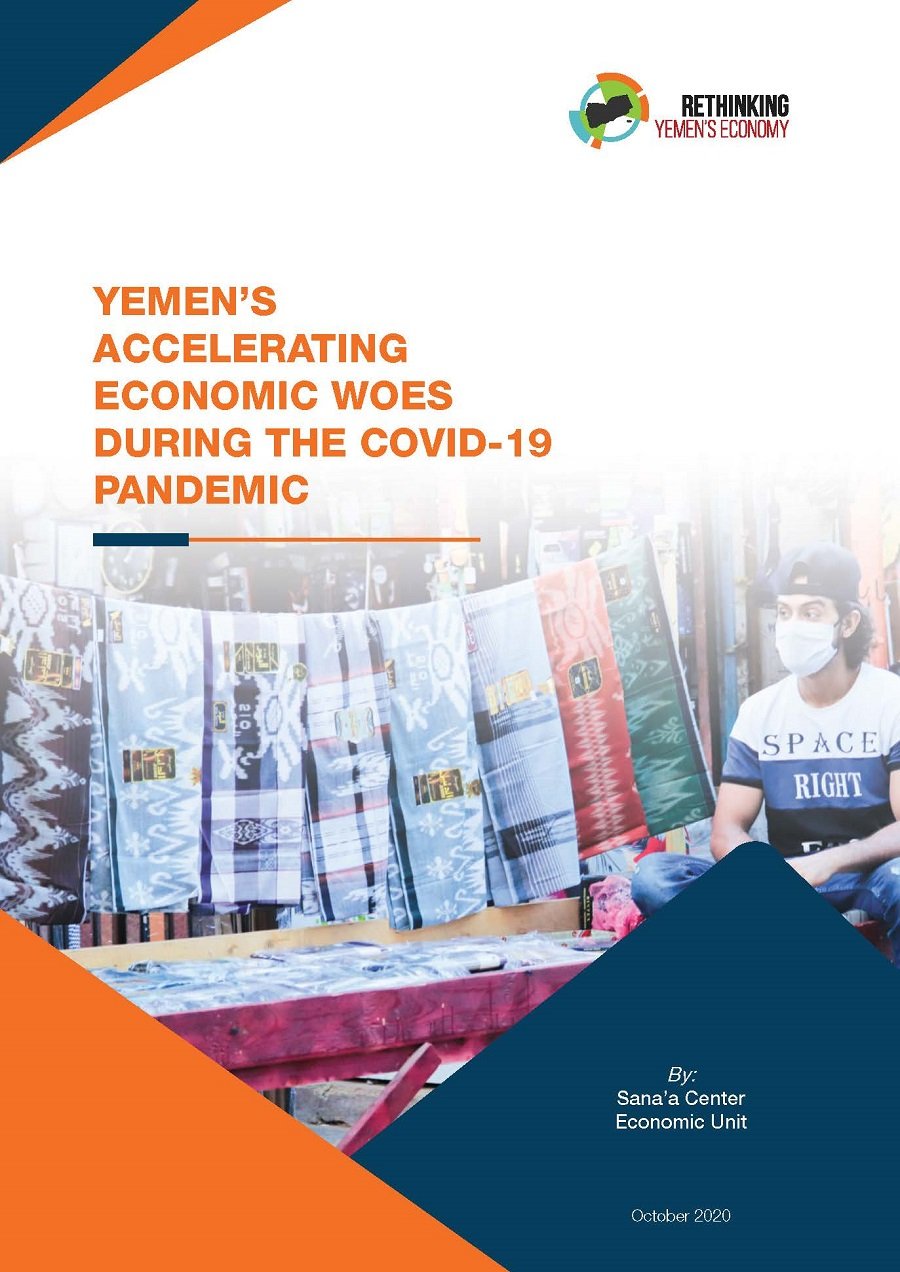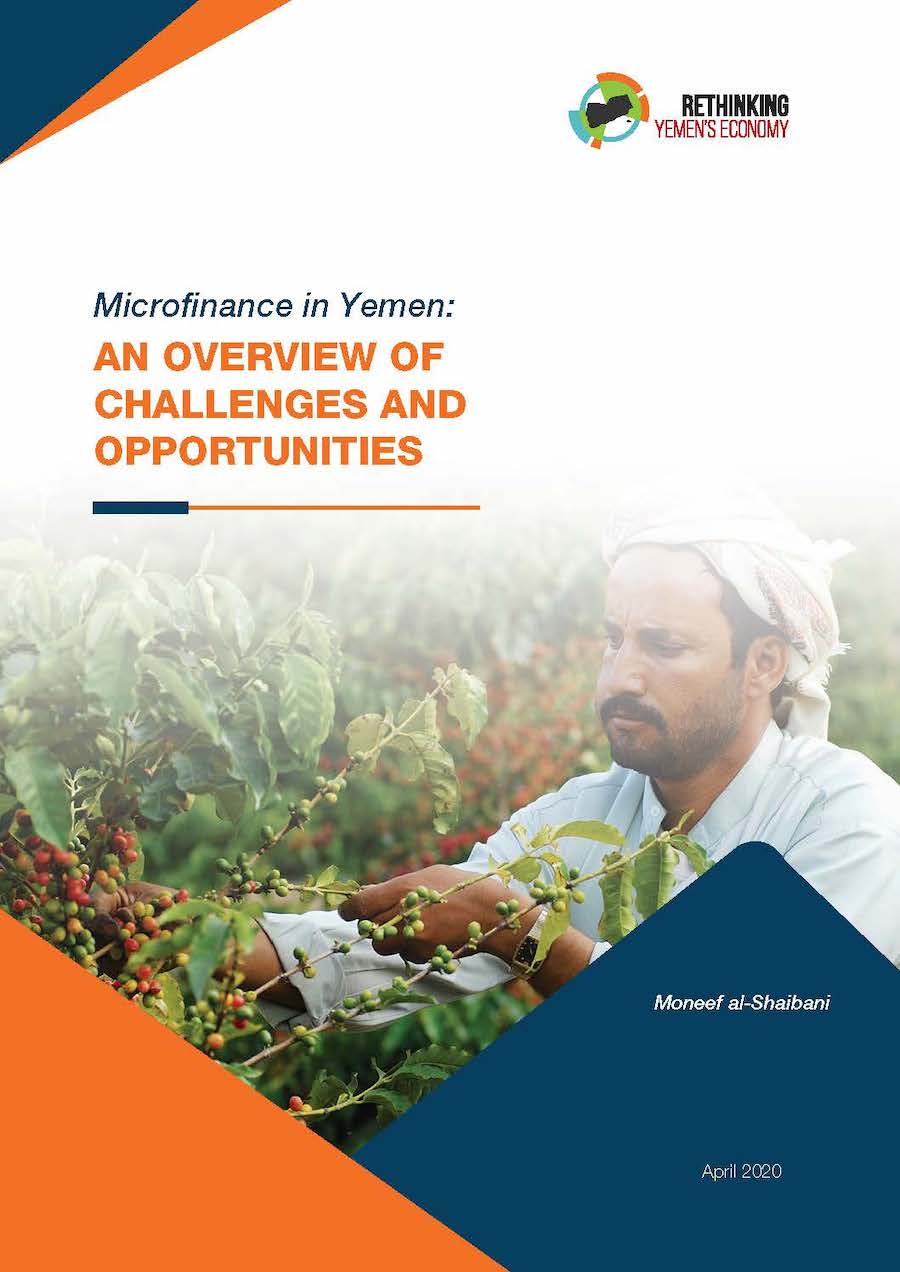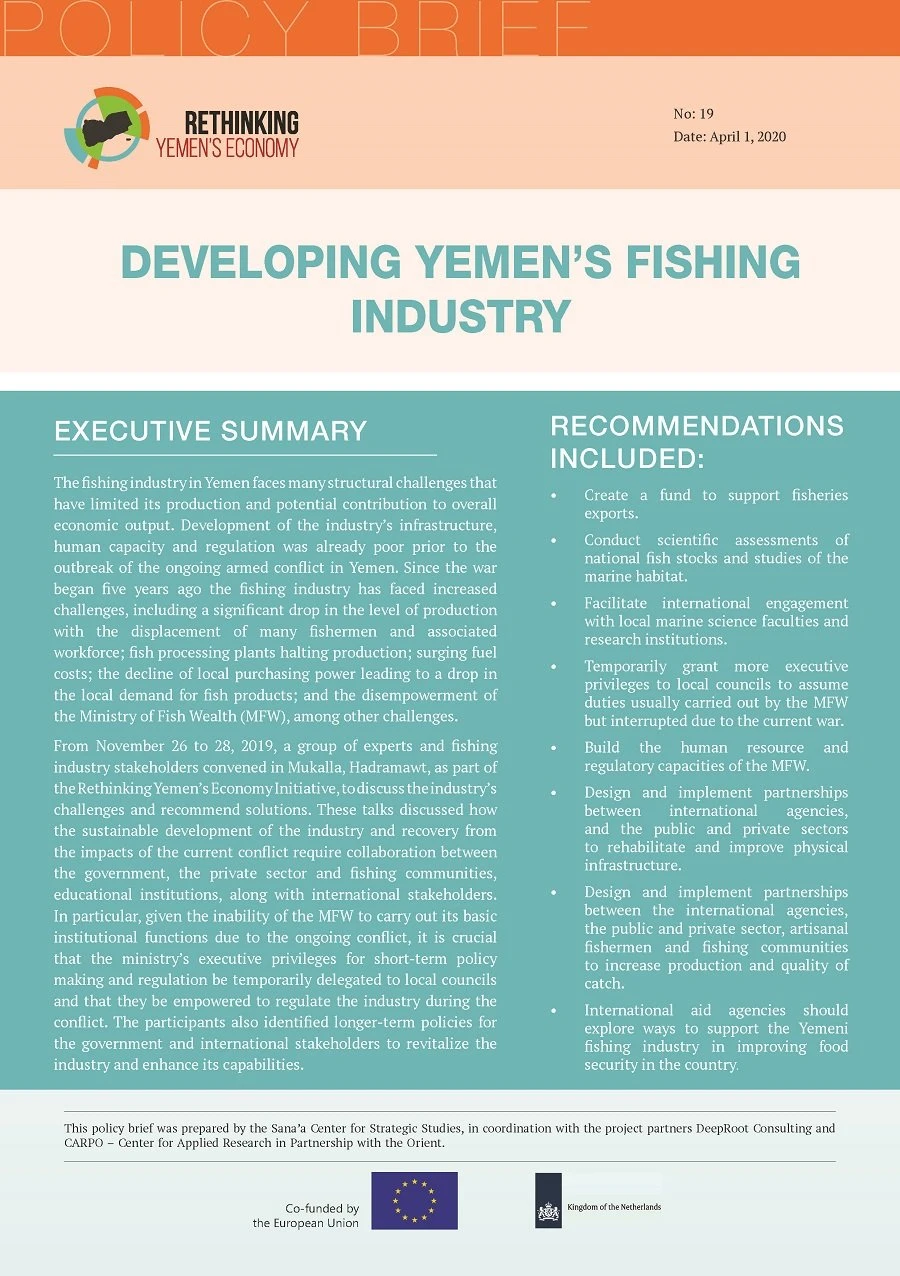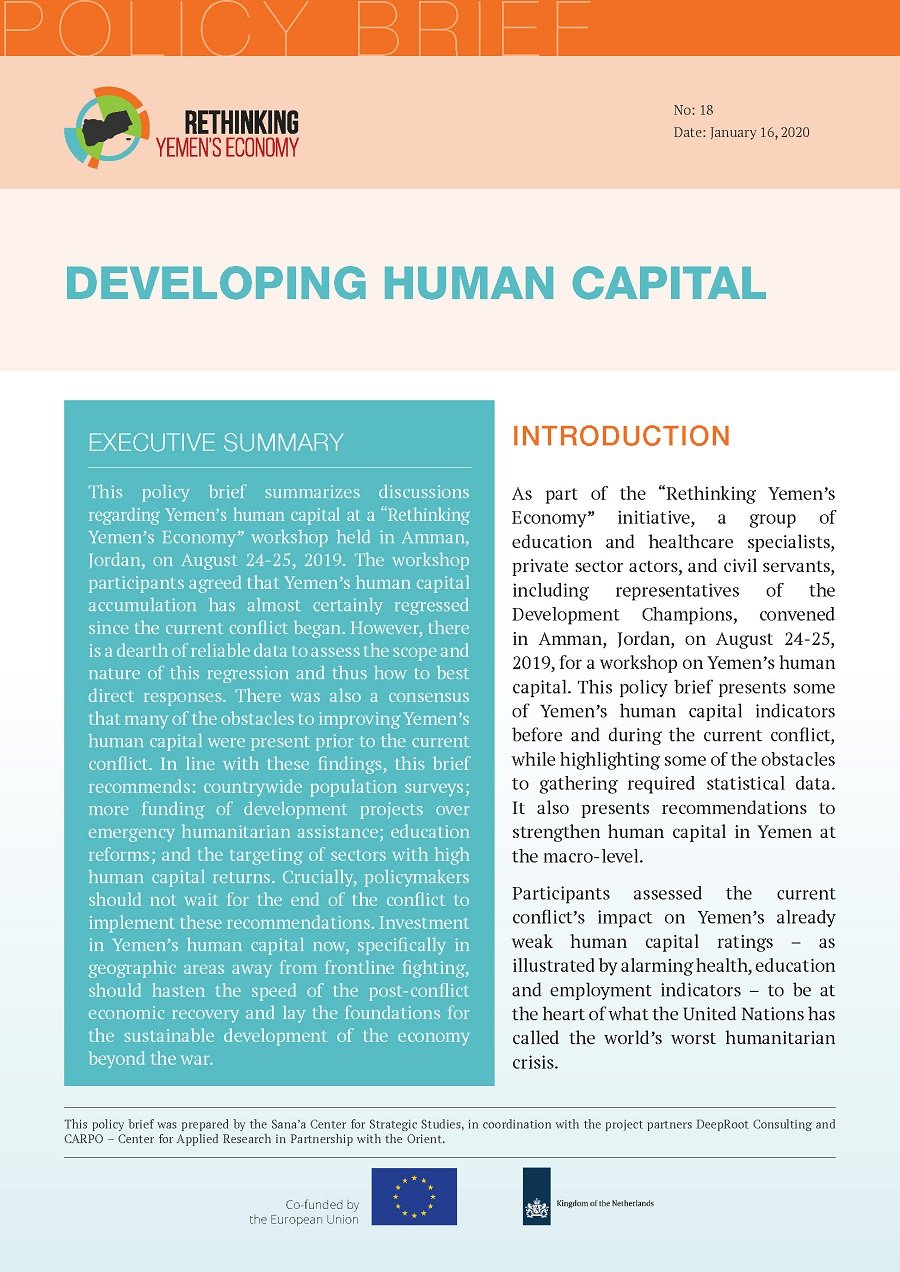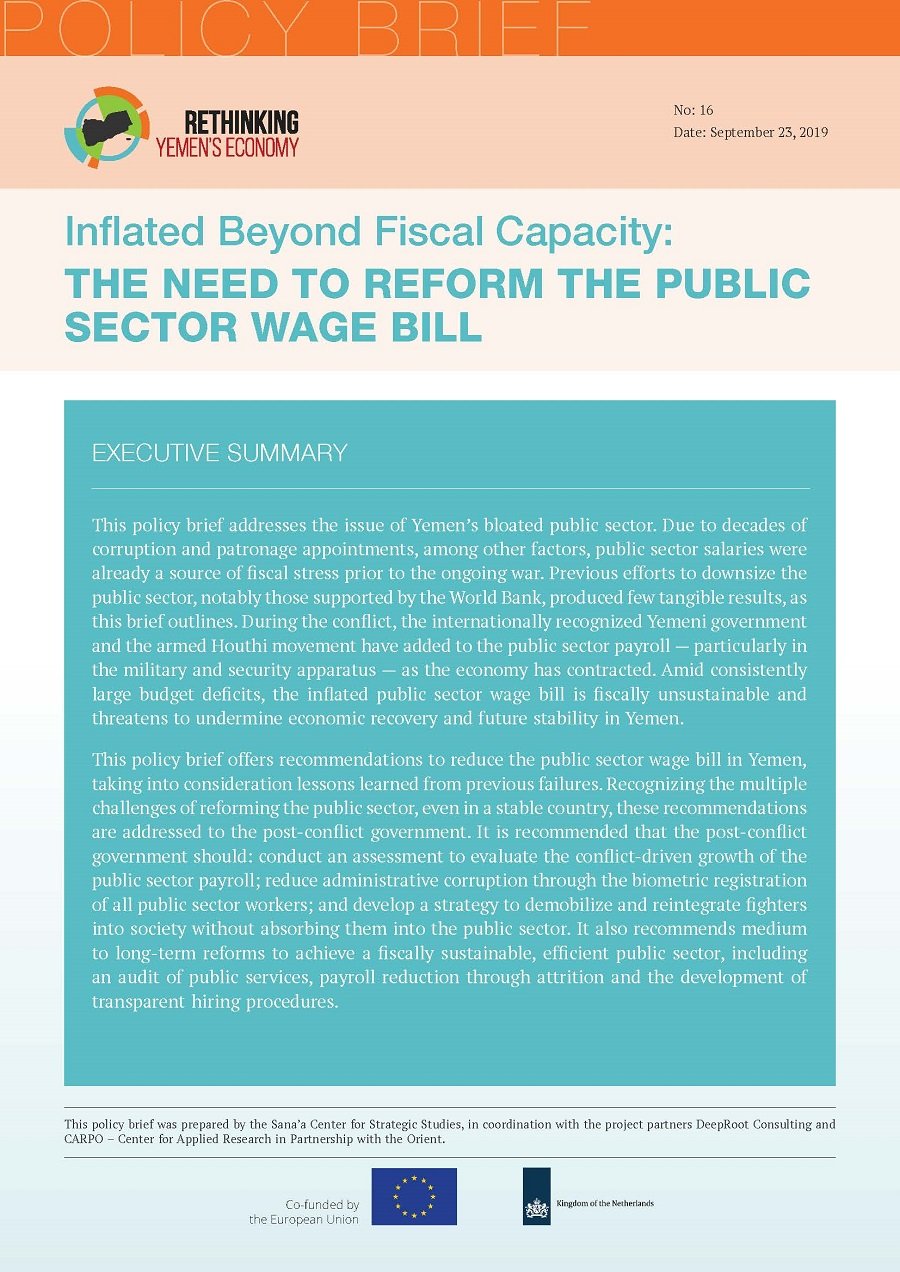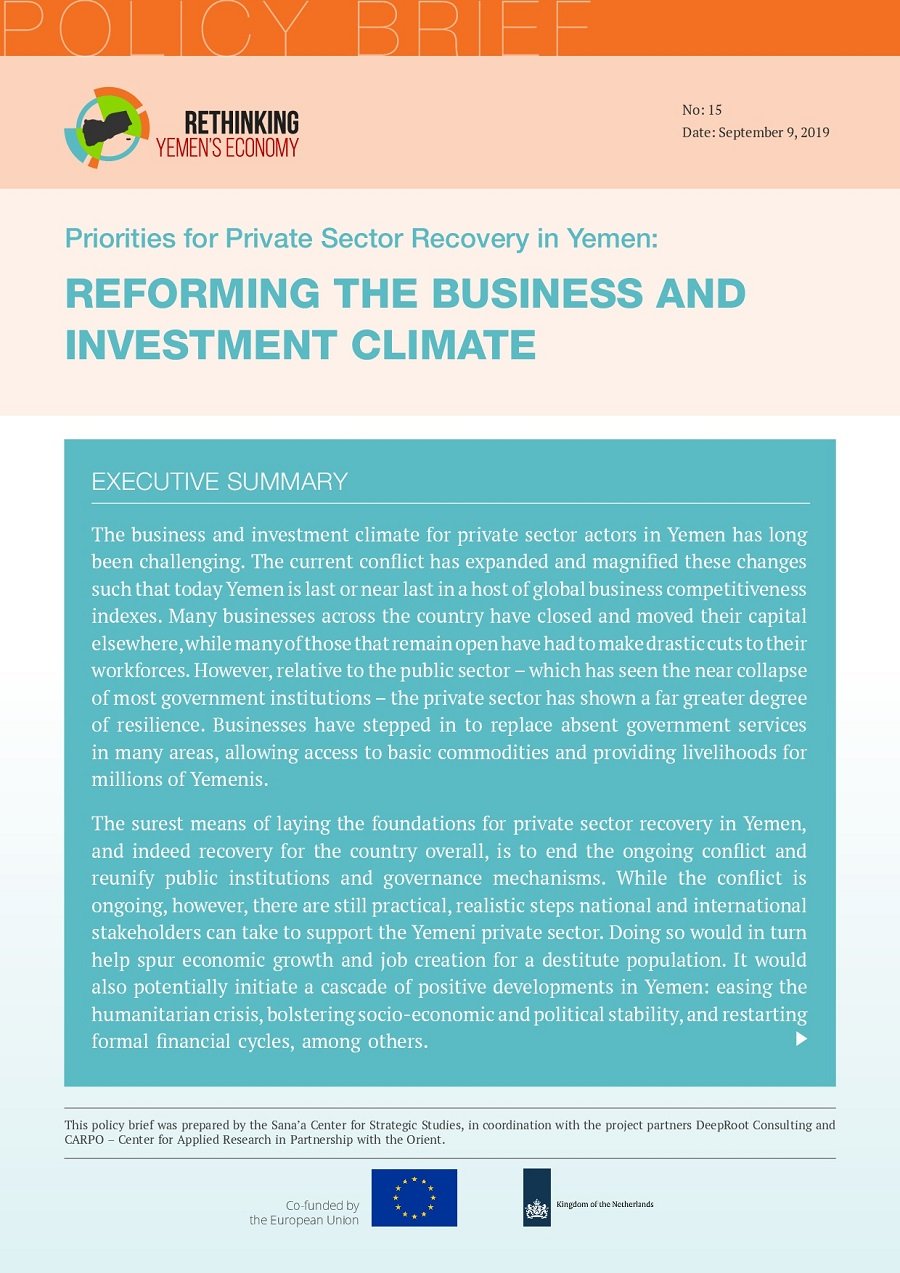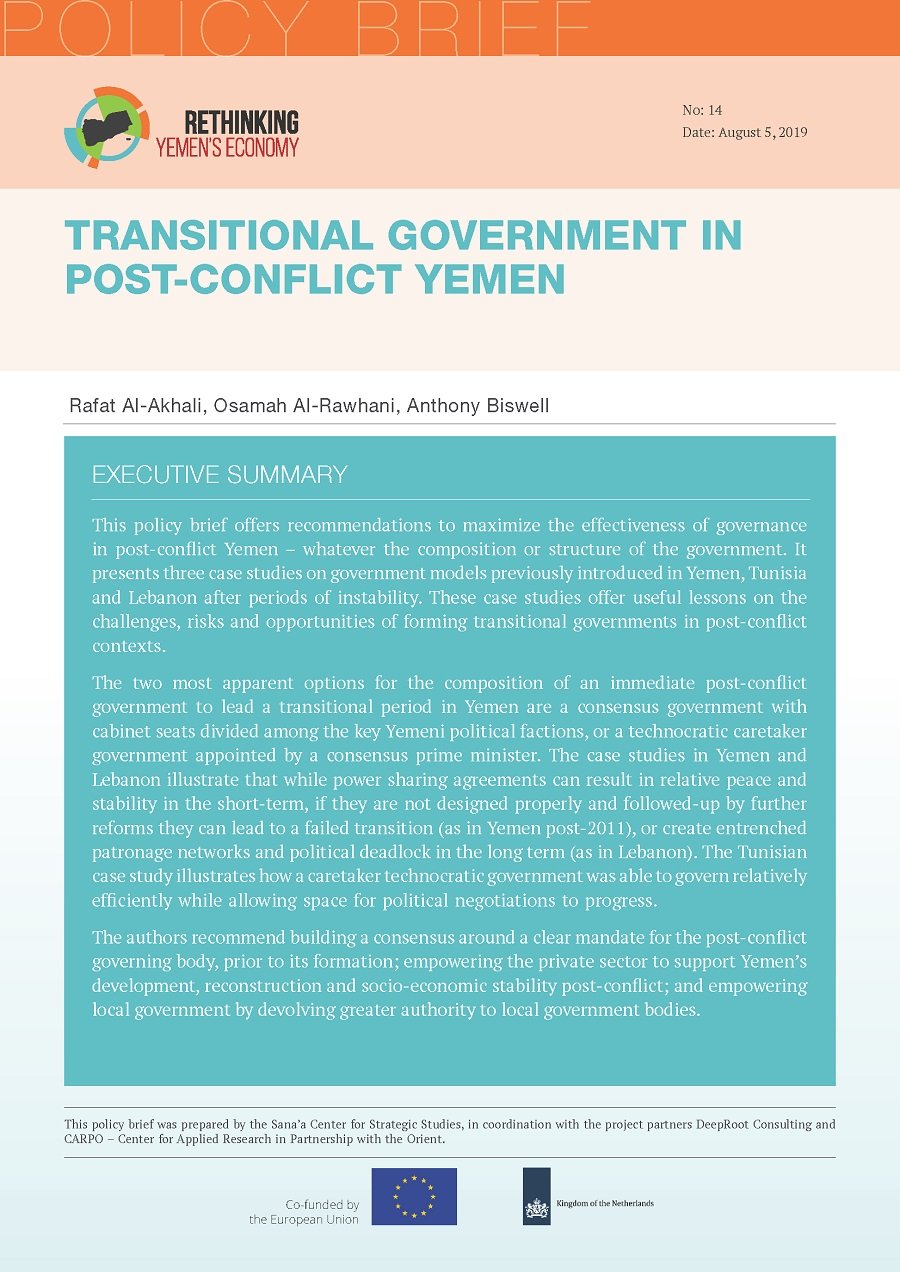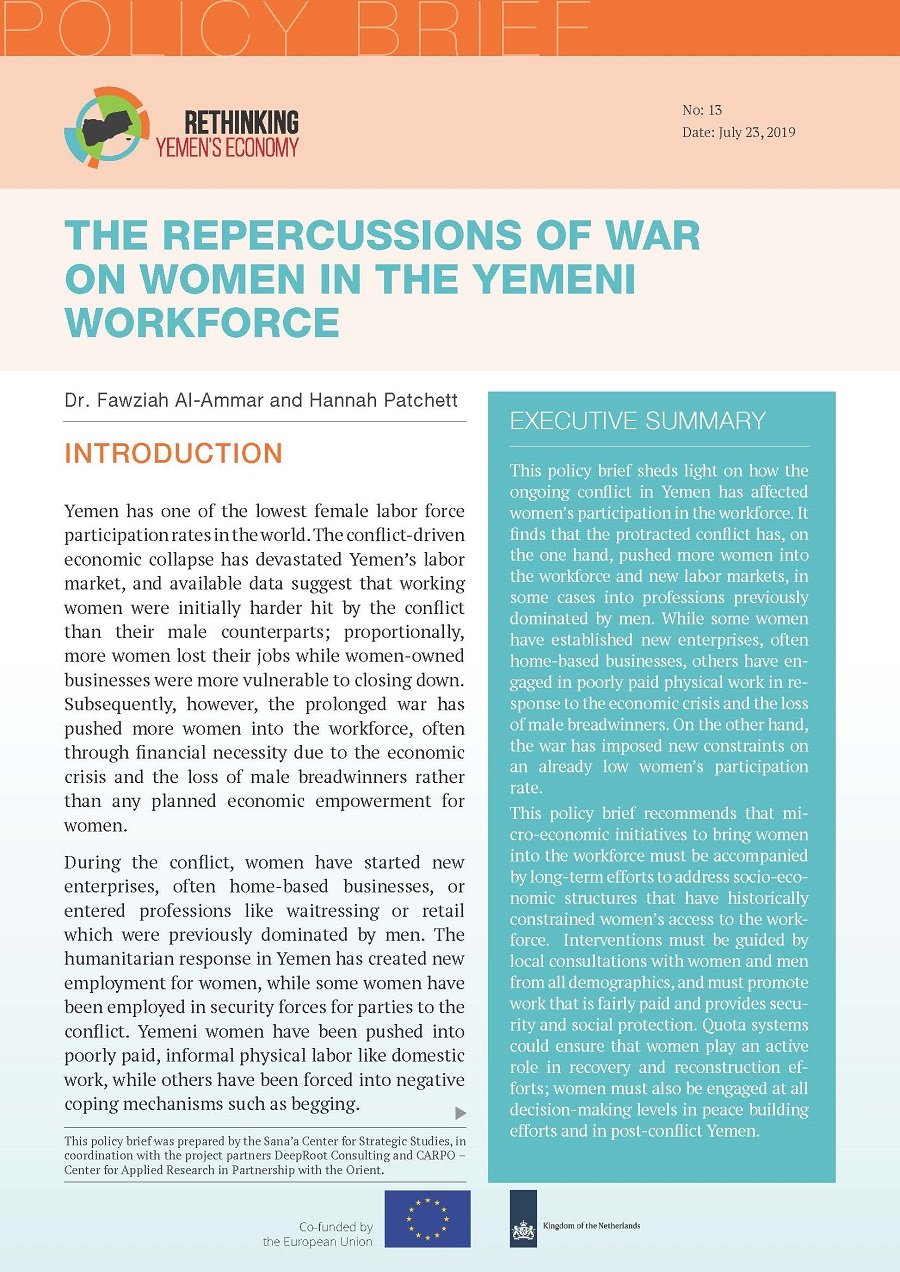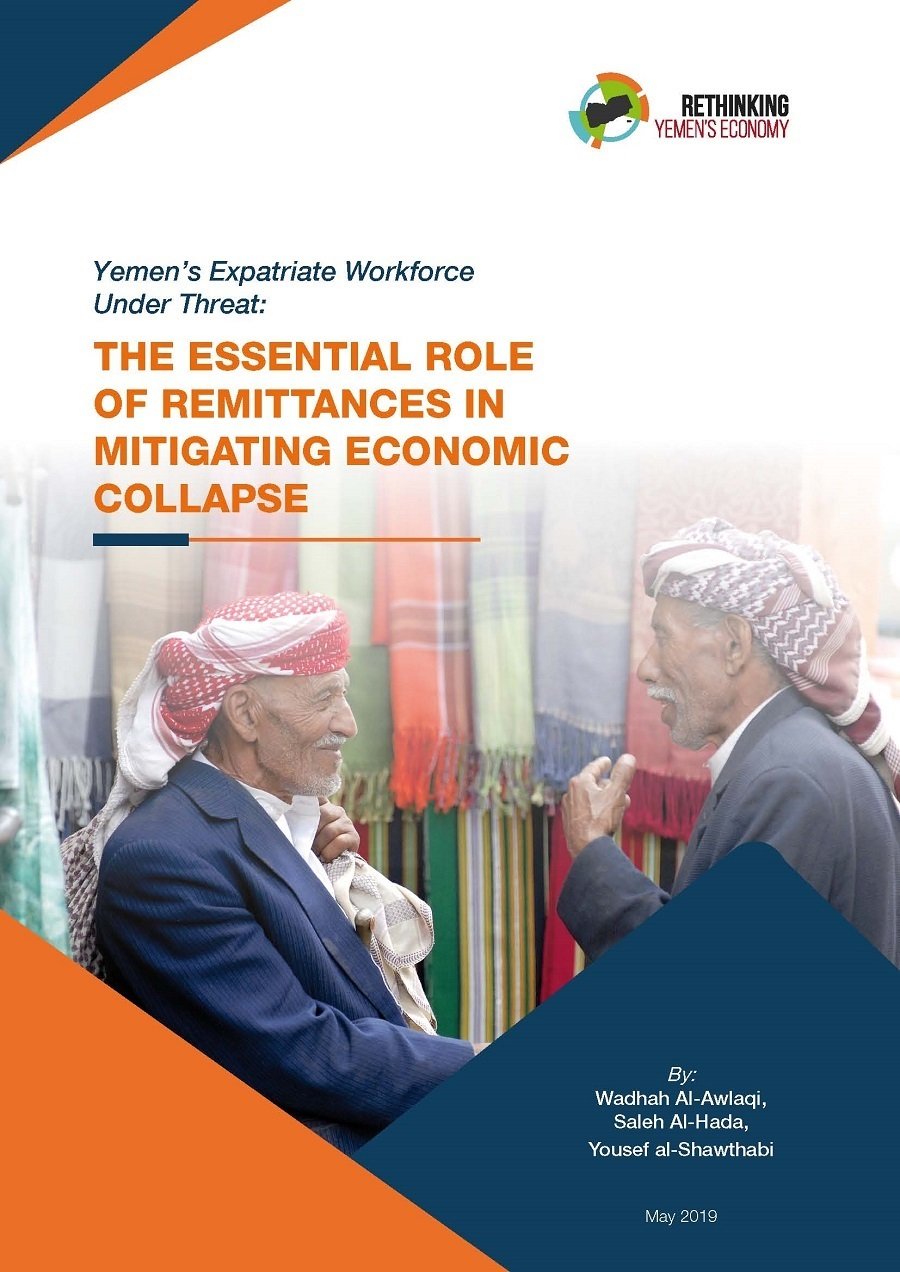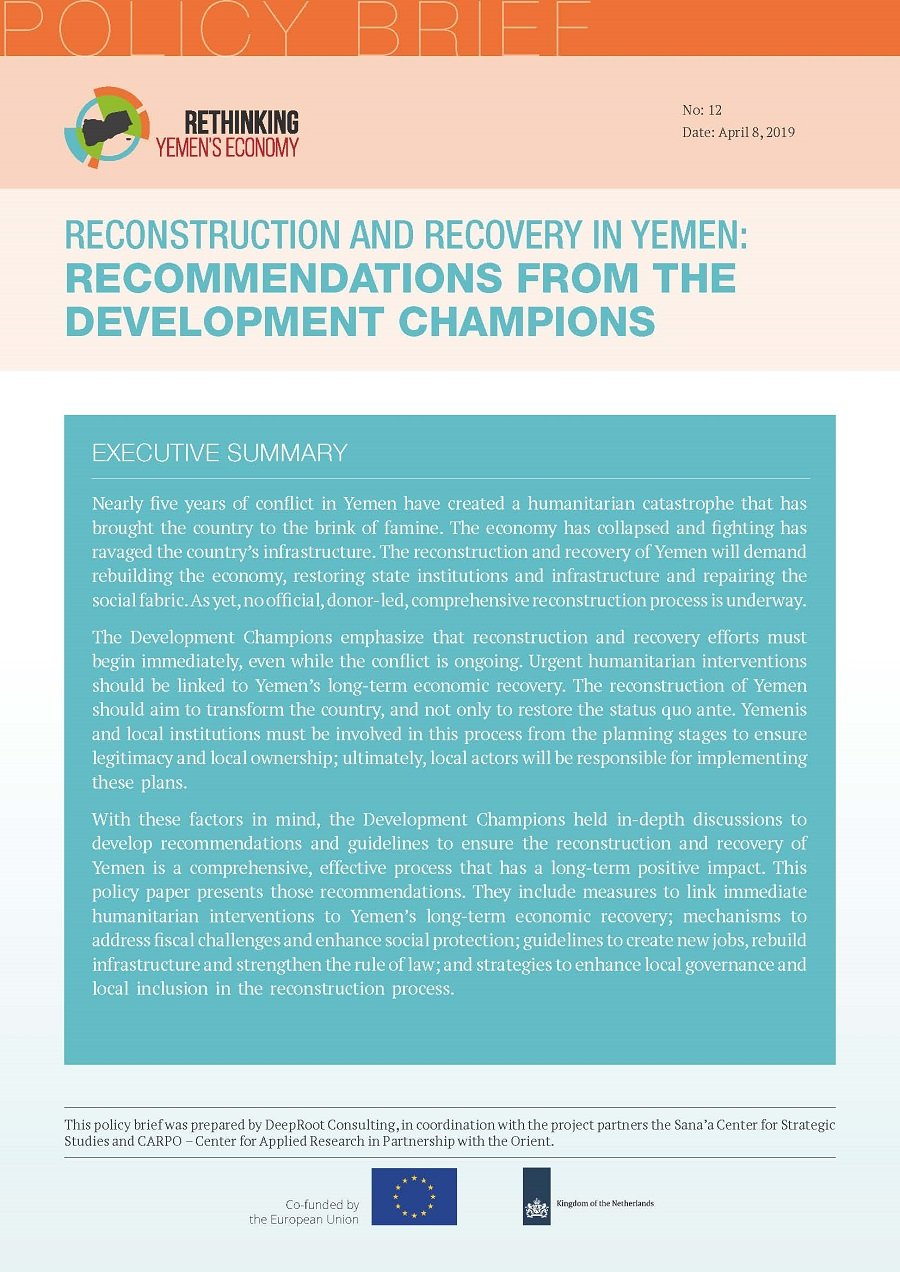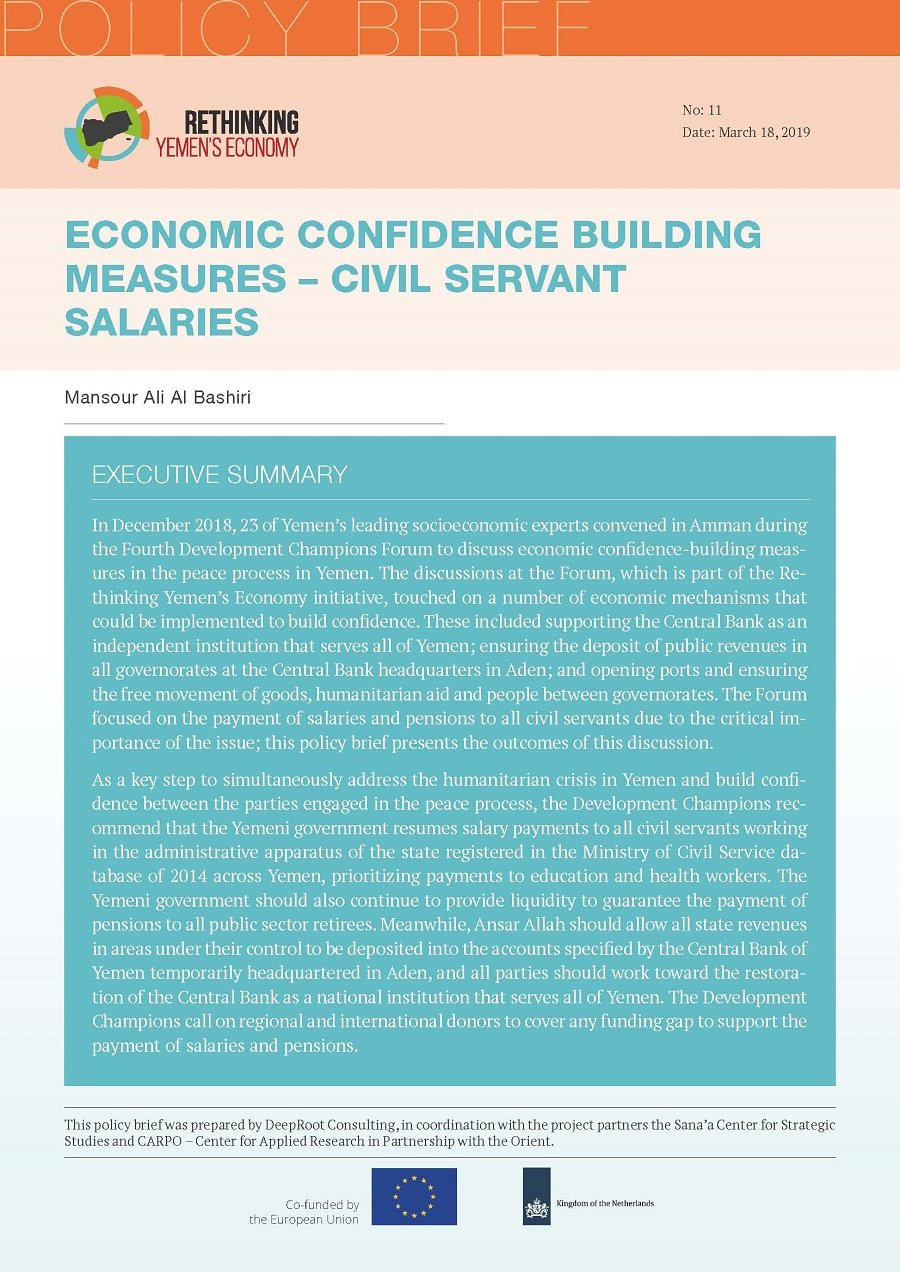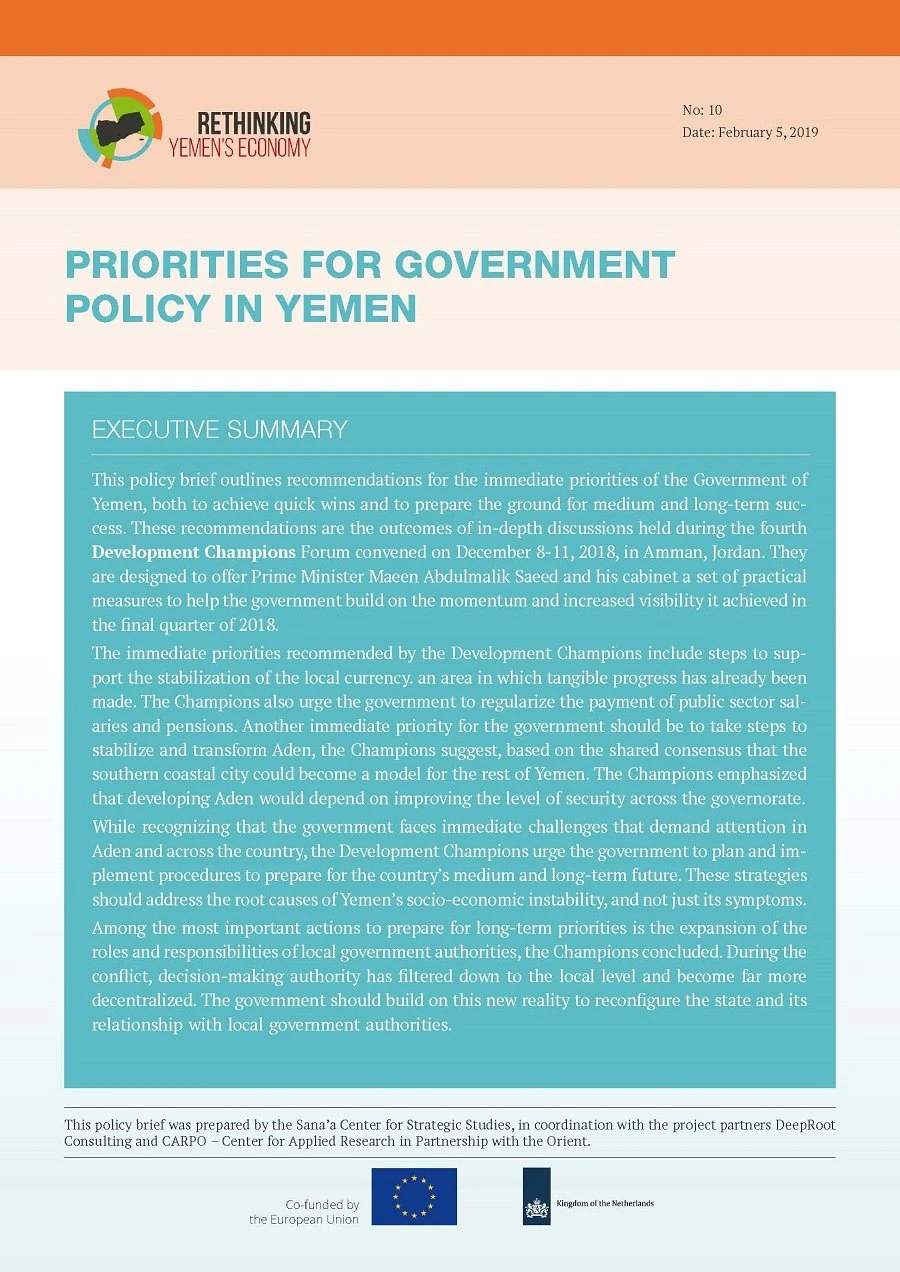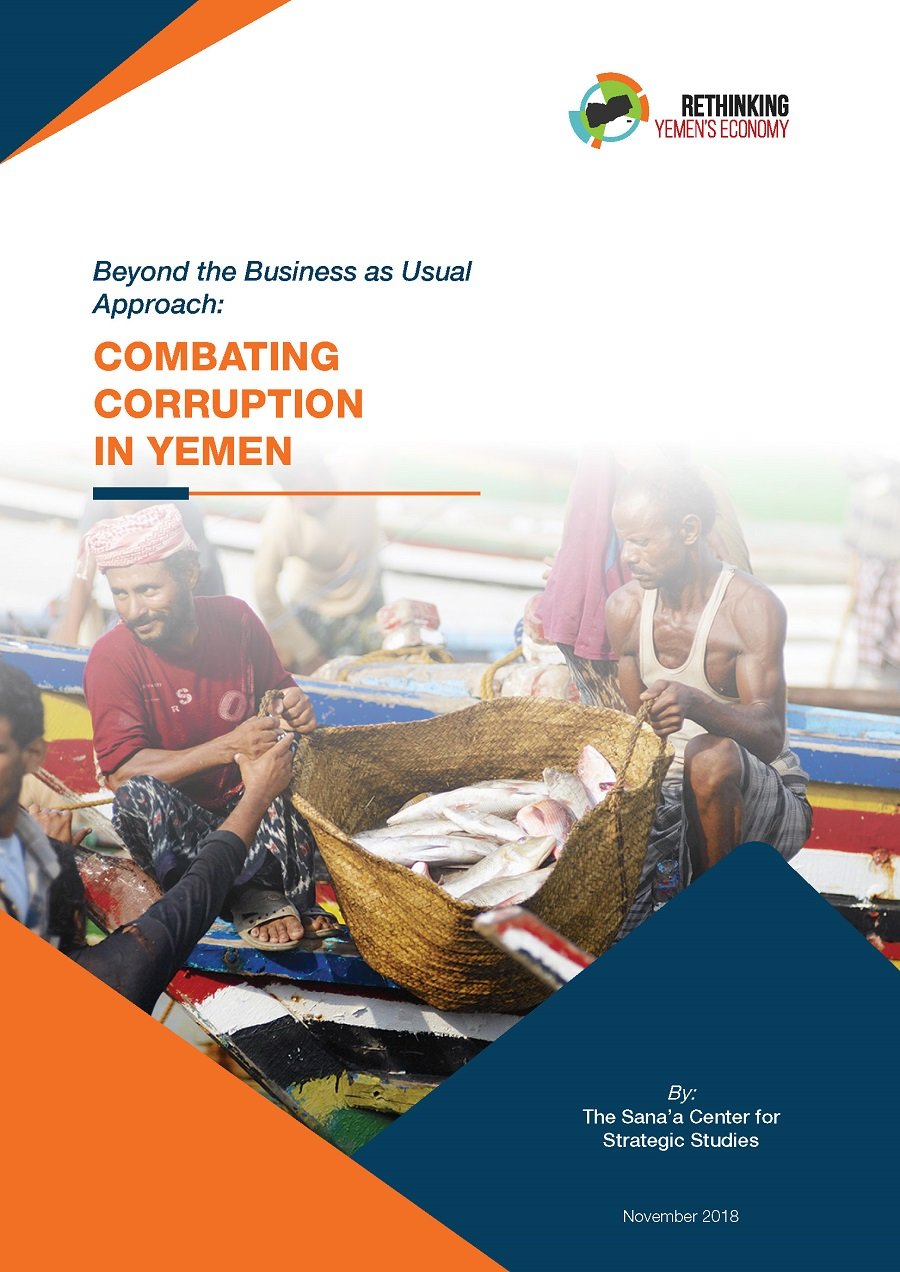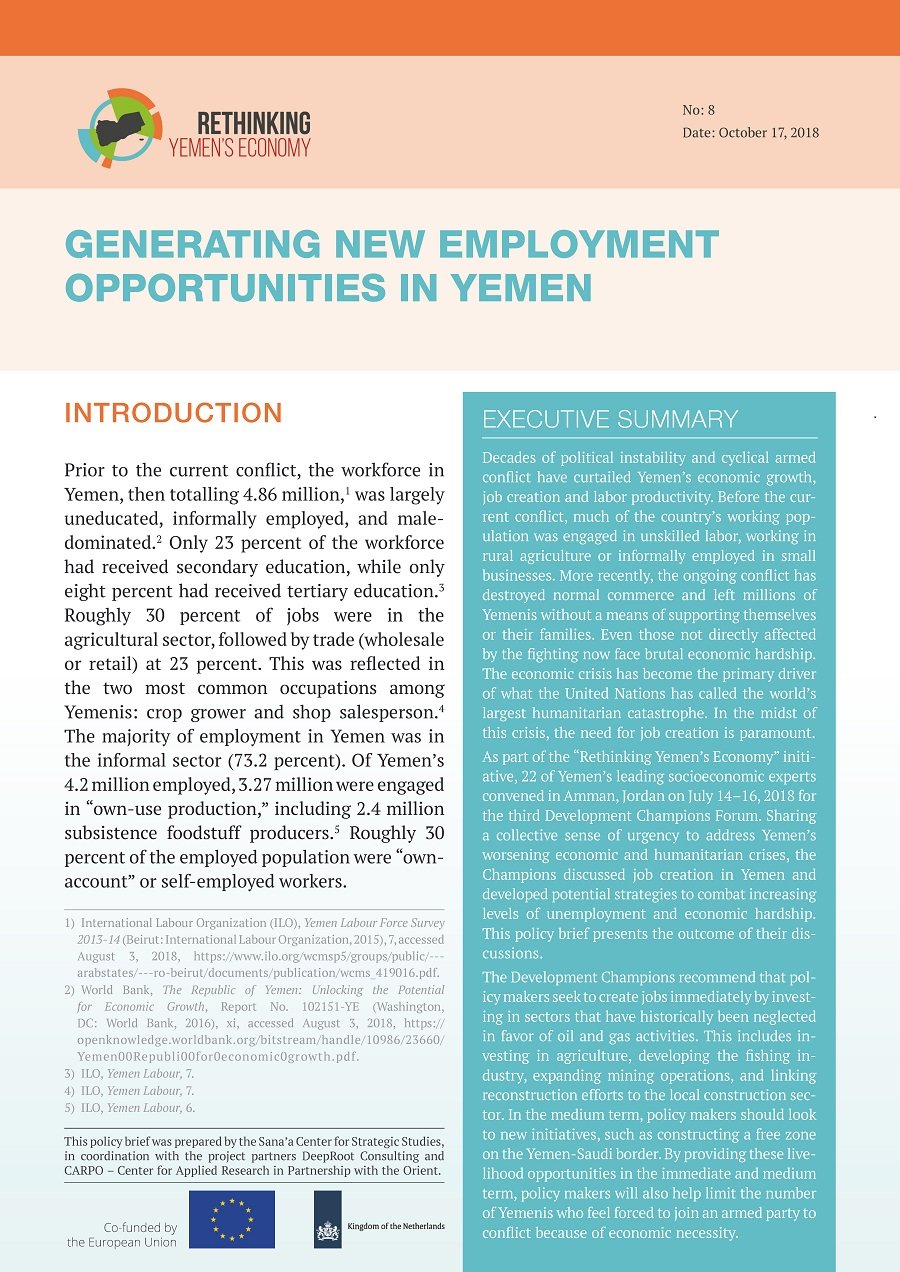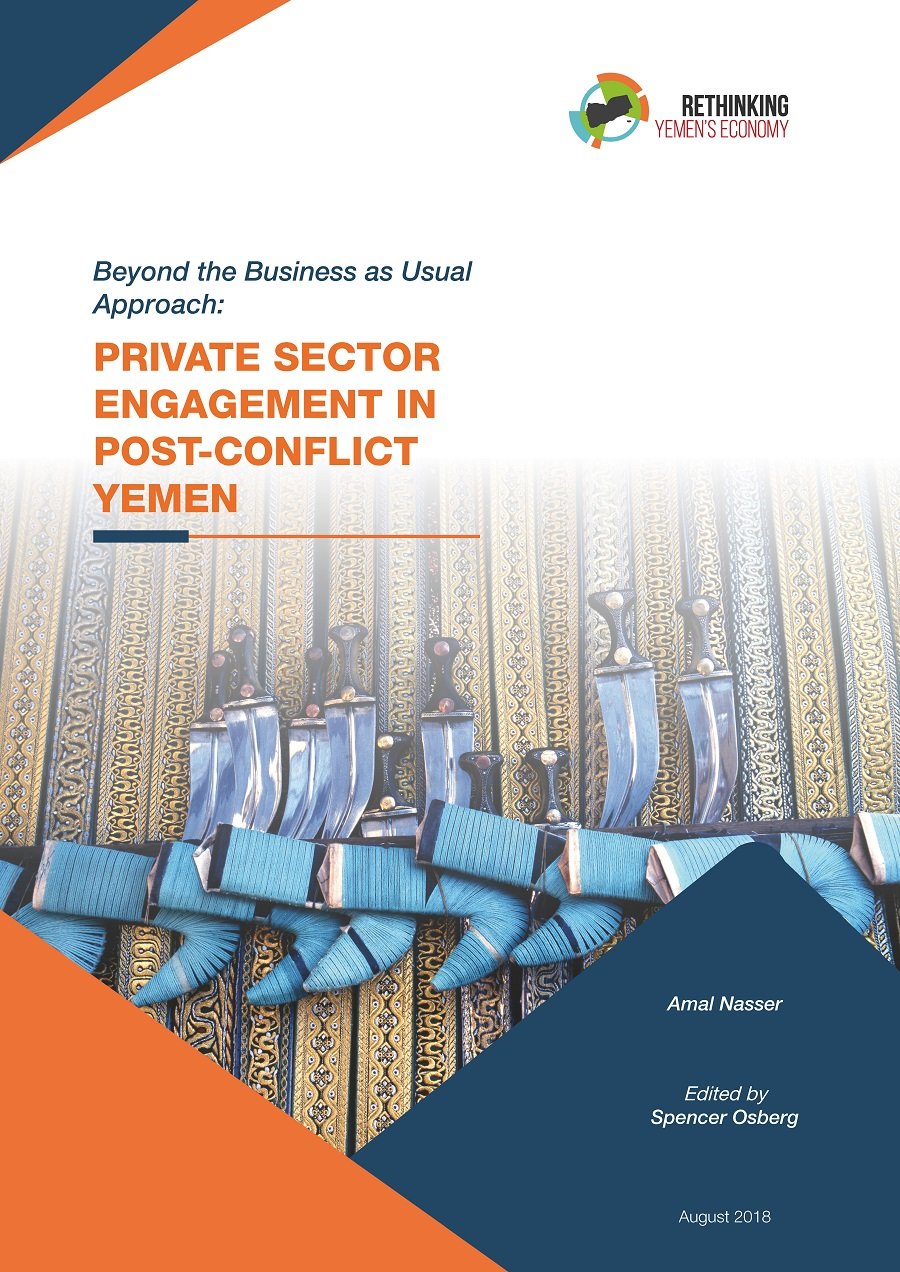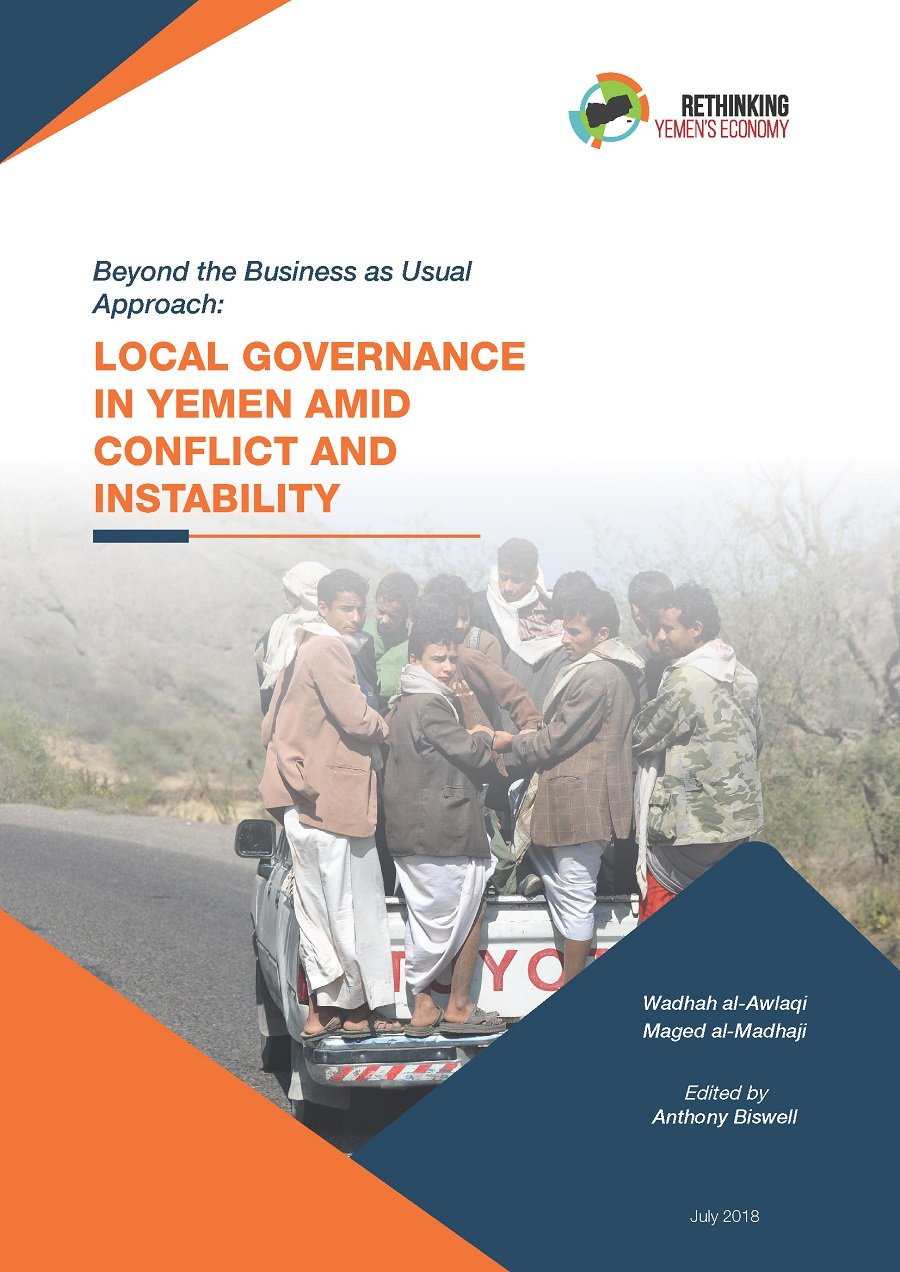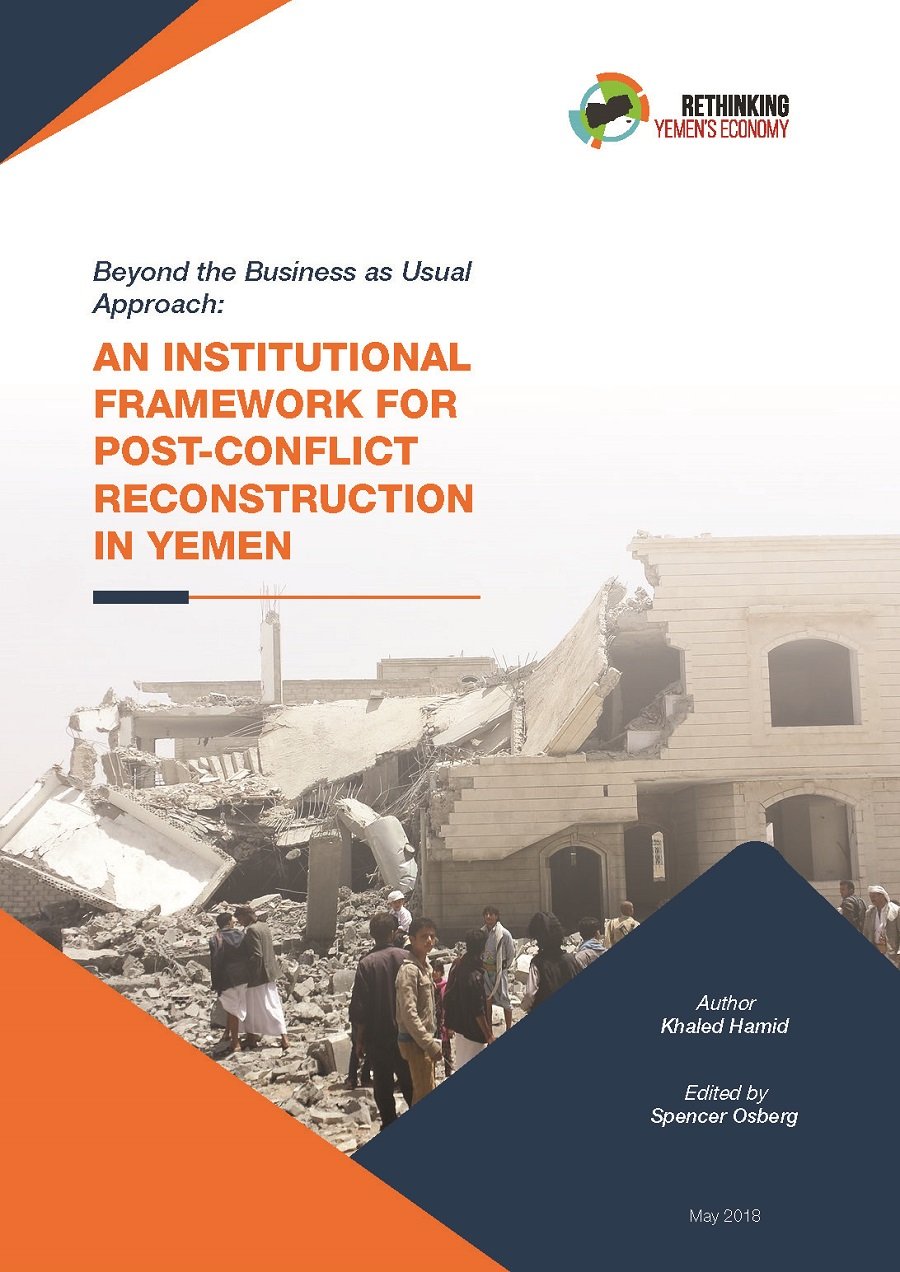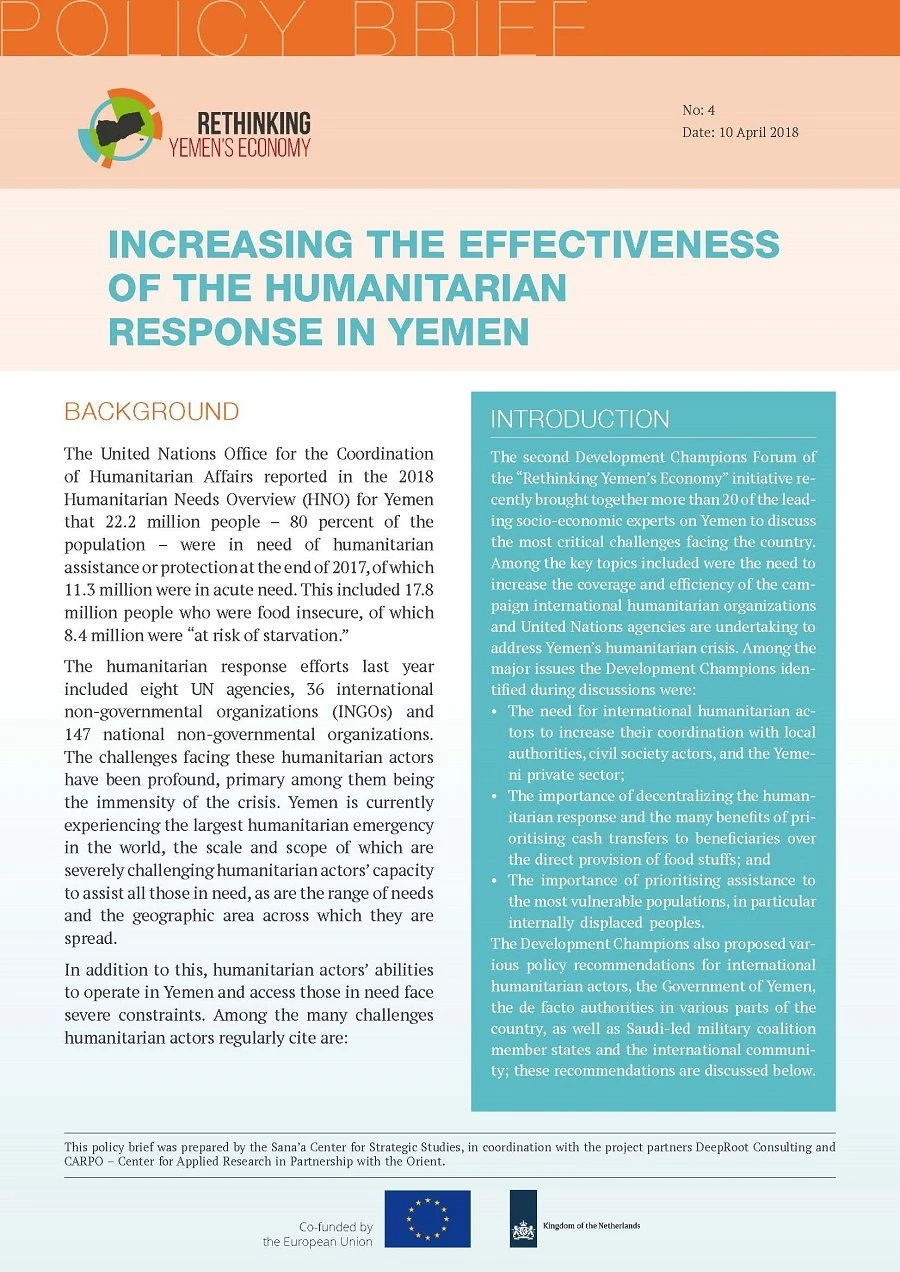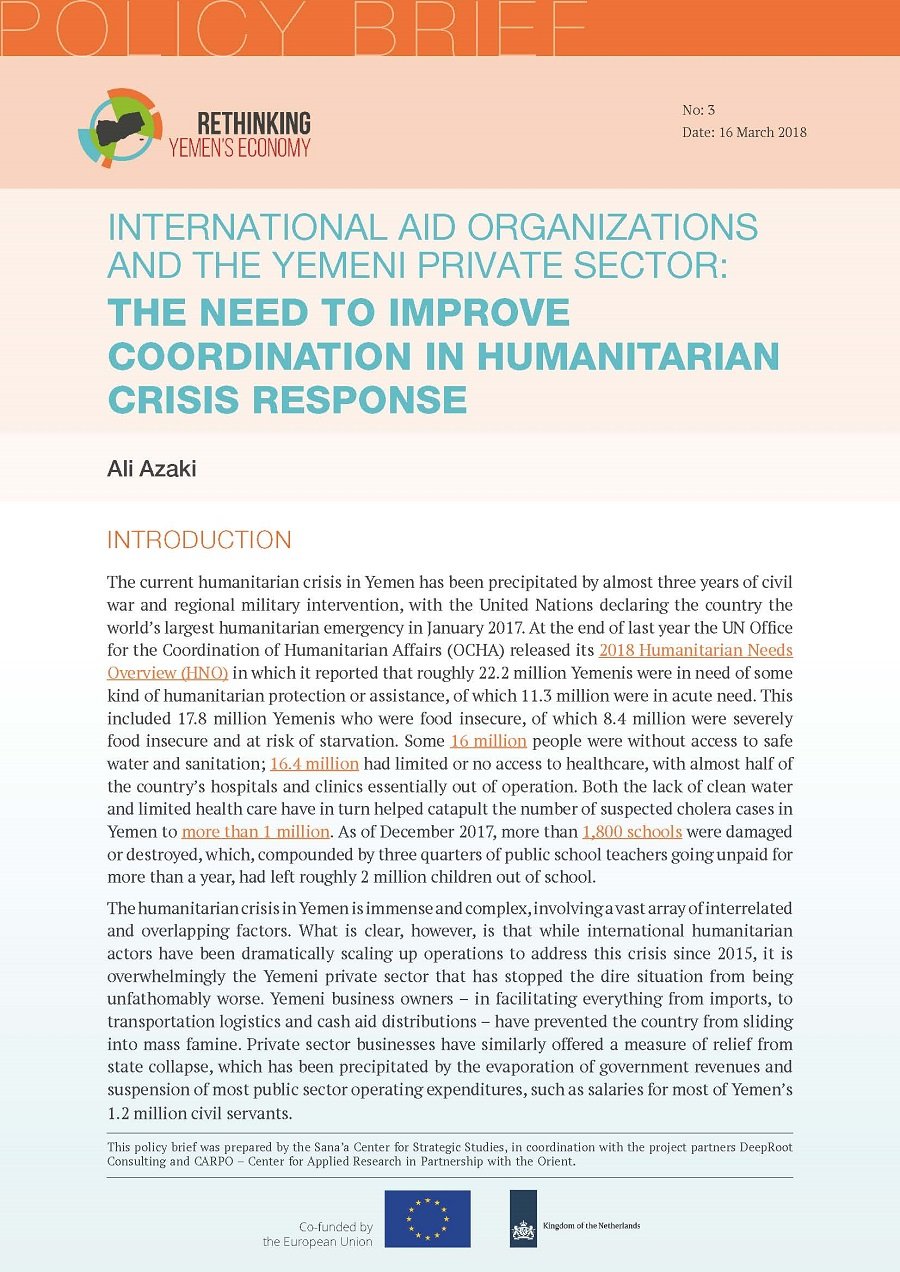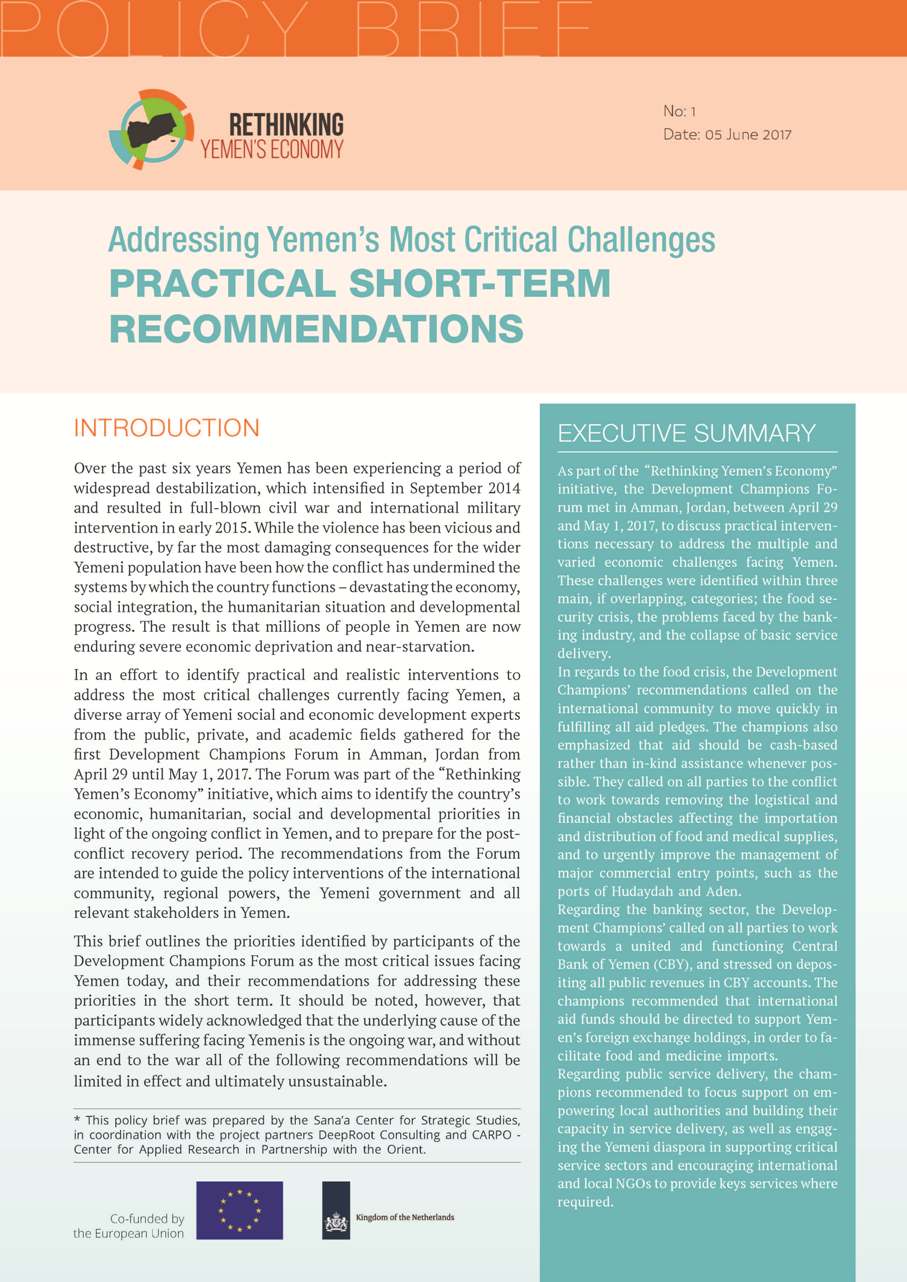Yemen’s agricultural communities face a perfect storm of growing ecological threats amid protracted conflict. Flash floods destroy farms, crops, and irrigation systems. Late rains risk drowning mature harvests, and waterlogged fields hinder root growth. Coastal areas battle salinization, and collapsed roads and buried wells hamper recovery. As flooding and changing rainfall patterns undermine yields, farmers […]
Read more...Category: Other
Empowering Local Authorities to Lead Economic Development in Yemen
This RYE Policy Brief, which is based on discussions the Development Champions Forum held in Cairo in December 2023, outlines a set of recommendations aimed at empowering local authorities in Yemen to effectively provide services and lead local economic development. The aim is to analyze and draw lessons from three ongoing tracks that seek to […]
Read more...Challenges to Yemen’s Public Revenues
Since April 2022, the war in Yemen has mutated from a high-casualty conflict to a protracted stalemate with relatively stable frontlines. The current phase has been marked by the expansion of economic warfare, with the Houthi authorities shutting down trade from internationally recognized government-controlled areas, stoking discontent as public utilities break down and the currency […]
Read more...Zooming in on the Yemen War. The Future of Warfare and Human Rights in the Middle East
Missiles, drones, precision-guided munition, and other military technologies that enable belligerents to attack their enemies from a distance are changing the concepts and practices of warfare. This can best be observed in the conflict-ridden region of the Middle East, particularly in the Yemen war, which has witnessed one of the most extensive use of missiles […]
Read more...Scaling Up Solar Energy Investments in Yemen
Poor electricity services remain a key barrier to sustainable economic development in Yemen, exacerbated by the ongoing conflict and related damages to the electricity sector’s infrastructure. Given Yemen’s high average hours of annual daily sunshine and a significant level of solar irradiation, solar energy is a viable and cost-effective alternative to the currently prevalent fossil […]
Read more...Addressing the Crushing Weight of Yemen’s Public Debt
For decades prior to the ongoing conflict, Yemen had been vulnerable to recurring budget deficits. The escalation of the ongoing conflict in 2014/15 has had a profoundly negative impact on Yemen’s debt position. Large-scale oil exports ceased, leading to a collapse in public revenues, while banks and pension funds stopped purchasing government debt instruments. Management […]
Read more...The Road Transport Sector in Yemen. Critical Issues and Priority Policies
Yemen is predominantly a rural country, with over 70% of the population living in 140,000 settlements in impoverished rural areas. Road transport is thus essential for the country’s development and overall economic growth. With only about 3,744km of paved rural roads, representing approximately 6.4% of all roads in the country, Yemen’s neglected road network poses […]
Read more...Challenges and Prospects for Electronic Money and Payment Systems in Yemen
Yemen has a heavily cash-based economy with low levels of financial inclusion. The country’s formal banking sector is highly underdeveloped, undercapitalized and concentrated in urban areas, leaving it inaccessible for most Yemenis. Plans by the Central Bank of Yemen to develop and improve electronic interbank transactions and local electronic payment systems, including mobile money services, […]
Read more...Improving Relations Between Central State Institutions and Local Authorities
Local councils are responsible for spearheading development projects and providing basic public services to Yemen’s population of more than 30 million people. The councils are particularly important in rural areas, where about 70 percent of Yemen’s population lives. In July 2018, the Rethinking Yemen’s Economy initiative published a White Paper that explored how the collapse […]
Read more...Local Economic Councils: A Tool to Improve Business Productivity in Yemen
From 25-27 January 2021, the seventh Development Champions Forum, held virtually, focused on the dire business environment in Yemen. To help address local economic challenges, the Development Champions discussed the possibility of establishing Local Economic Councils. According to their analysis, between the community-level local development committees and the Supreme Economic Council on the national level, […]
Read more...Priorities for the Recovery and Reform of the Electricity Sector in Yemen
Poor electricity services in Yemen, even before the war, have been one of the key barriers to sustainable economic development and basic service provision (e.g., water supply, health care, education). This paper assesses the power supply system status prior to the war and subsequently discusses the impact of the war on electricity sector performance, followed […]
Read more...Solar-Powered Irrigation in Yemen: Opportunities, Challenges and Policies
Yemen is one of the most water-scarce countries in the world. Its agricultural sector is the dominant user of groundwater resources, accounting for around 90 percent of total consumption. Due to the current crisis, fuel required for pumps has become scarce and very expensive; as a result, solar energy has begun to play a role […]
Read more...Local Security Governance in Yemen in Times of War
by Mareike Transfeld, Mohamed al-Iriani, Maged Sultan and Marie-Christine Heinze After six years of war, state institutions in Yemen have fragmented along multiple fault lines. The security sector is no exception. Given their role as central nodes of the country’s security governance structure, this Policy Report explores governorate-level Security Committees in three governorates that have […]
Read more...Impacts of the War on the Telecommunications Sector in Yemen
The telecommunications and information technology sector in Yemen is the second largest source of public revenue after the petroleum sector, and contributes important work opportunities, whether directly or indirectly, through its connections to other sectors of the national economy. Some of the most important challenges of the sector are the unsuitability of the legal and […]
Read more...Yemen’s Accelerating Economic Woes during the COVID-19 Pandemic
Since early 2015, Yemen has been almost completely dependent on three external sources to secure foreign currency inflows and stimulate economic activity: foreign humanitarian aid, Saudi financial support to the internationally recognized government, and – by far the most significant – remittances from Yemeni expatriates, most working in Saudi Arabia. All three of these foreign […]
Read more...Economic Priorities for a Sustainable Peace Agreement in Yemen
The sustainability of a peace agreement in Yemen will, amongst others, depend on two critical insights: First, in a conflict that is largely over access to resources, the issues of distribution and control of those resources can make or break peace. Second, where peace agreements lack provisions that create overall economic stability, warfare can resume […]
Read more...Microfinance in Yemen. An Overview of Challenges and Opportunities
This White Paper explores the historic development of Yemen’s microfinance industry and its players, as well as the impacts of the ongoing conflict. This analysis is followed by recommendations that address four specific areas – capacity building, financing, program design and research – to help create a more conducive operating environment for microfinance overall. The […]
Read more...Developing Yemen’s Fishing Industry
This policy brief summarizes discussions regarding Yemen’s fishing industry at a ‘Rethinking Yemen’s Economy’ workshop held in al-Mukalla, Yemen, on November 26-28, 2019. The workshop participants, among them numerous stakeholders in the fishing industry from across Yemen, agreed that given the inability of the Ministry of Fish Wealth to carry out its basic institutional functions […]
Read more...Developing Human Capital
This Policy Brief summarizes discussions regarding Yemen’s human capital at a ‘Rethinking Yemen’s Economy’ workshop held in Amman, Jordan, on August 24-25, 2019. The workshop participants agreed that many of the obstacles to improving Yemen’s human capital were present prior to the current conflict. This Policy Brief thus recommends: countrywide population surveys; more funding of […]
Read more...Restructuring Public Finances in Yemen
This Policy Brief addresses the issue of public finances in Yemen, which have long suffered from an overdependence on energy exports, one of the lowest tax collection rates in the world, and chronic budget and balance of payments deficits. With the intensification of the conflict in 2015, energy exports and foreign grants were frozen, while […]
Read more...The Need to Reform the Public Sector Wage Bill
This Policy Brief addresses the issue of Yemen’s bloated public sector. Amid consistently large budget deficits, the inflated public sector wage bill is fiscally unsustainable and threatens to undermine economic recovery and future stability in Yemen. Recognizing the multiple challenges of reforming the public sector, even in a stable country, the recommendations brought forward in this […]
Read more...Priorities for Private Sector Recovery in Yemen
This Policy Brief addresses the need for private sector recovery in Yemen and gives recommendations for the improvement of the overall business and investment climate. While the private sector has shown a far greater degree of resilience than the public sector and in many cases stepped in to replace government services, its situation – and […]
Read more...Transitional Government in Post-Conflict Yemen
This Policy Brief offers recommendations to maximize the effectiveness of governance in post-conflict Yemen – whatever the composition or structure of the government. It presents three case studies on government models previously introduced in Yemen, Tunisia and Lebanon after periods of instability. These case studies offer useful lessons on the challenges, risks and opportunities of […]
Read more...The Repercussions of War on Women in the Yemeni Workforce
This Policy Brief sheds light on the impact of the ongoing conflict in Yemen on women’s participation in the workforce. It finds that the protracted conflict has, on the one hand, pushed more women into the workforce and new labor markets, in some cases into professions previously dominated by men. On the other hand, the […]
Read more...The Essential Role of Remittances in Mitigating Economic Collapse
This White Paper addresses the impact of Saudi Arabia’s increasingly restrictive handling of its expatriate workforce on the economy in Yemen. The kingdom’s policies, which have forced tens of thousands of Yemenis to return home, have resulted in a dramatic loss of income from remittances for their families in Yemen at a time when the […]
Read more...Reconstruction and Recovery in Yemen
This Policy Brief brings forward the results of in-depth discussions held by the Development Champions with the aim of developing recommendations and guidelines to ensure the reconstruction and recovery of Yemen is a comprehensive, effective process that has a long-term positive impact. The Champions’ recommendations include measures to link immediate humanitarian interventions to Yemen’s long-term […]
Read more...Economic Confidence-Building Measures – Civil Servant Salaries
This Policy Brief brings forward crucial recommendations resulting out of the fourth Development Champions Forum in Amman, held in December 2018. The Development Champions recommend that the Yemeni government resumes salary payments to all civil servants working in the administrative apparatus of the state registered in the Ministry of Civil Service database of 2014 across […]
Read more...Priorities for Government Policy in Yemen
This Policy Brief outlines recommendations for the immediate priorities of the Government of Yemen, both to achieve quick wins and to prepare the ground for medium and long-term success. These recommendations are the outcomes of in-depth discussions held during the fourth Development Champions Forum convened on 8-11 December 2018 in Amman, Jordan. They are designed to […]
Read more...Combating Corruption in Yemen
This White Paper assesses the multifaceted pervasiveness of corruption in Yemen. It is demonstrated, amongst others, that patronage networks are now emerging among previously marginal or unknown figures and that the financial involvement of Saudi Arabia and the United Arab Emirates has extended patronage across national borders. It is argued that any anti-corruption agenda must […]
Read more...Generating New Employment Opportunities in Yemen
This brief brings forward crucial recommendations to address Yemen’s worsening economic and humanitarian crises. These recommendations result from the third Development Champions Forum, which took place in Amman, Jordan, between 14–16 July 2018 as part of the “Rethinking Yemen’s Economy” initiative.
Read more...Private Sector Engagement in Post-Conflict Yemen
This White Paper assesses the factors weighing on private sector development in Yemen. It lays out the impacts of the 2011 uprising in Yemen, the ensuing political crisis and the current conflict on the economy and the private sector. Following this, recommendations are offered to both the Yemeni government and international stakeholders regarding steps that […]
Read more...Local Governance in Yemen Amid Conflict and Instability
This White Paper deals with the role of local councils in Yemen and analyses their current situation. In the absence of central state authority and despite all the challenges they face, these councils remain important instruments for coordinating humanitarian relief efforts and local-level conflict mediation. Local councils are among the best-equipped and best-established institutions to […]
Read more...Working Paper: Bridging the Relief to Rehabilitation Gap in Yemen. A Conversation with National and International Experts
herausgegeben von Andrea Warnecke and Bilkis Zabara This publication is an output of our 2018 summer school, which introduced students to the theory and practice of linking relief, reconstruction, and peacebuilding efforts in Yemen in light of the ongoing war. As the fighting and airstrikes in Yemen have continued unabatedly, several international governmental and non-governmental […]
Read more...An Institutional Framework for Post-Conflict Reconstruction in Yemen
This White Paper proposes an institutional structure for a future reconstruction process in Yemen: a permanent, independent, public reconstruction authority that empowers and coordinates the work of local reconstruction offices, established at the local level in areas affected by conflict or natural disasters. This proposal does not arise only from lessons learned from previous reconstruction […]
Read more...Increasing the Effectiveness of the Humanitarian Response in Yemen
This brief brings forward recommendations to enhance the effectiveness of the humanitarian response in Yemen. These recommendations result from the second Development Champions Forum, which took place in Amman, Jordan, between 14–16 January 2018 as part of the “Rethinking Yemen’s Economy” initiative.
Read more...International Organizations and the Yemeni Private Sector
This brief addresses the role of the Yemeni private sector in mitigating the humanitarian crisis in Yemen as well as its relationship to international humanitarian organizations. It finds that a large number of Yemeni business owners have been engaged in trying to alleviate the suffering of Yemenis out of their own volition, but also in service of and cooperation with international humanitarian agencies.
Read more...Restoring Central Bank Capacity and Stabilizing the Rial
This brief brings forward crucial recommendations to address Yemen’s current challenges in the financial sector. These recommendations result from the second Development Champions Forum, which took place in Amman, Jordan, between 14–16 January 2018 as part of the “Rethinking Yemen’s Economy” initiative.
Read more...Working Paper: Knowledge in Peacebuilding: Elements, Production, Dissemination
This publication is the result of a summer school entitled “Academic Approaches to Peacebuilding in Yemen” held in Amman, Jordan, in September 2016, which brought together advanced academics from the University of Bonn and the Gender-Development Research & Studies Center at Sanaa University as well as MA and PhD students from Yemen and Germany.
Read more...“Women Nowadays Do Anything.” Women’s Role in Conflict, Peace and Security in Yemen
This study brings together the findings of qualitative research conducted in Ibb and Aden by the Yemen Polling Center (YPC) in cooperation with CARPO and Saferworld.
Read more...Addressing Yemen’s Most Critical Challenges. Practical Short-term Recommendations
This brief summarizes the short-term recommendations to address Yemen’s current most critical challenges in development and economy which resulted from the first Development Champions Forum. This Forum took place in Amman, Jordan, between April 29 and May 1, 2017 as part of the “Rethinking Yemen’s Economy” initiative.
Read more...
